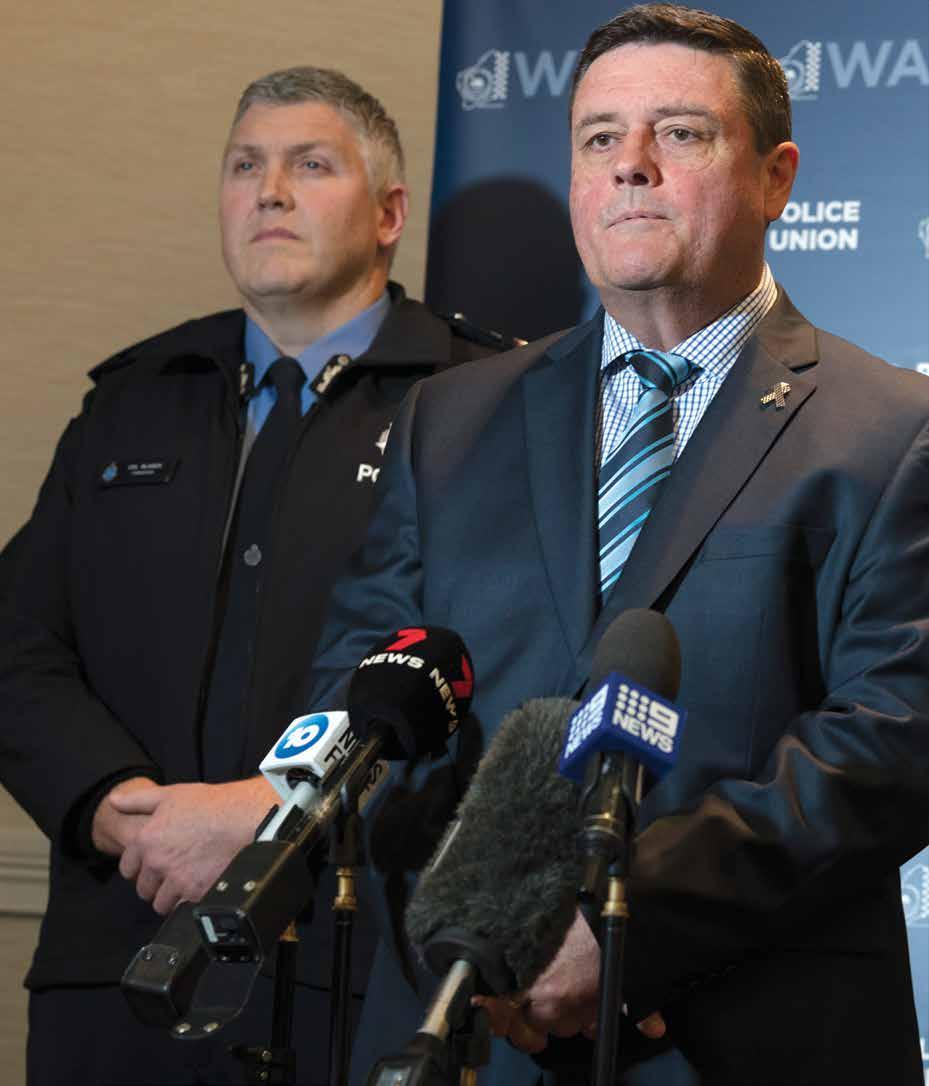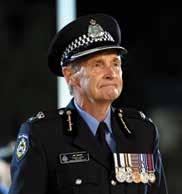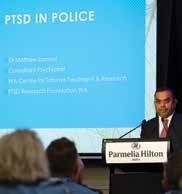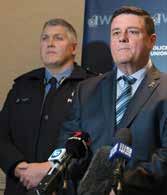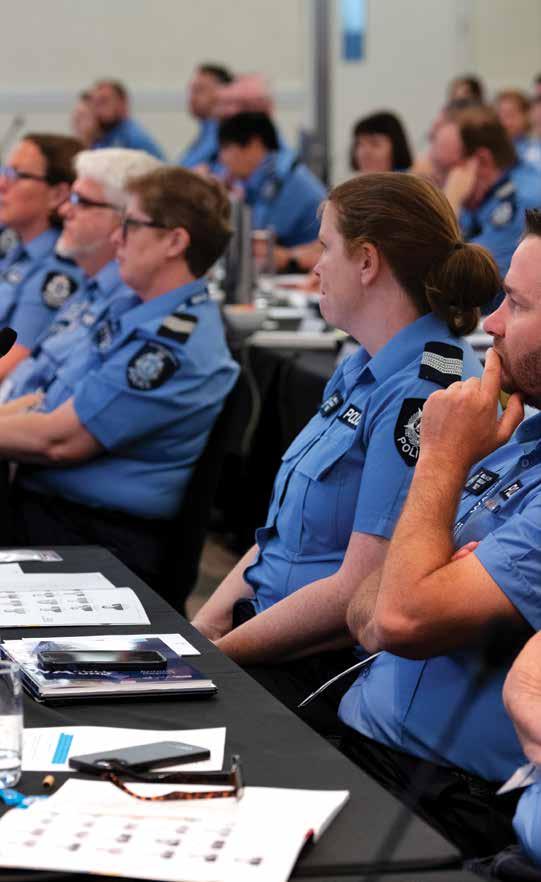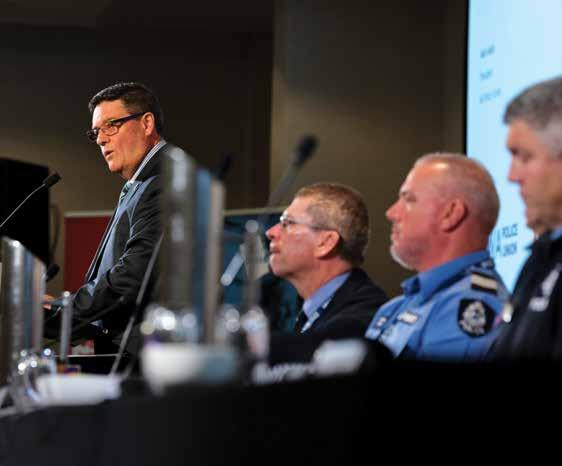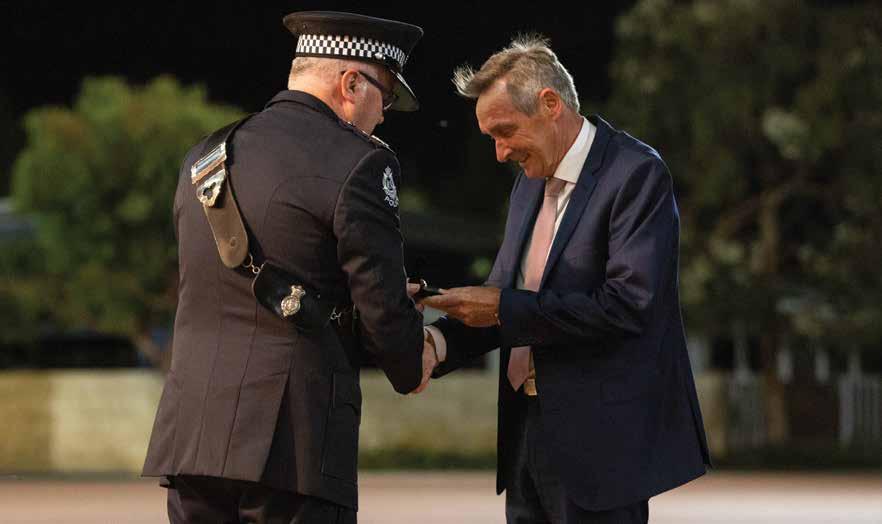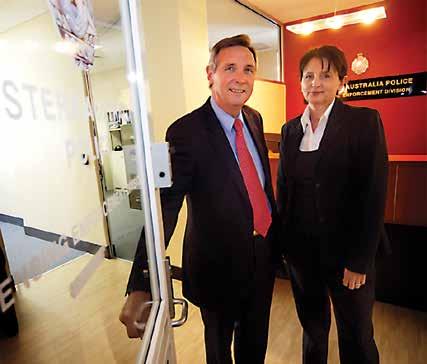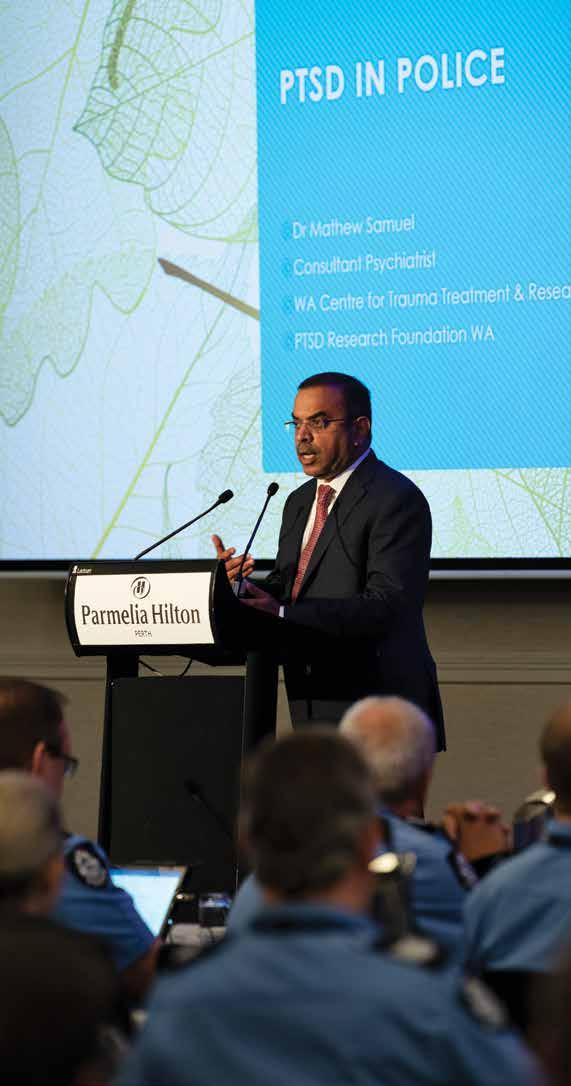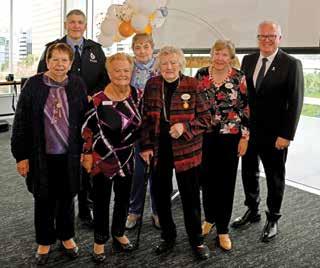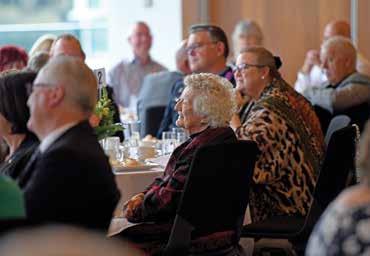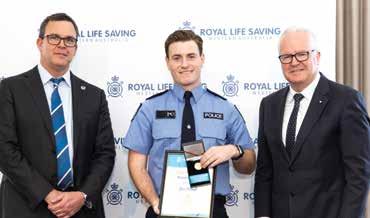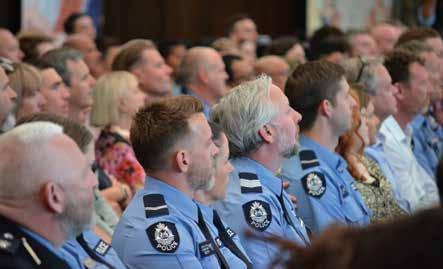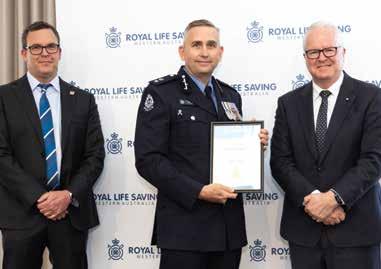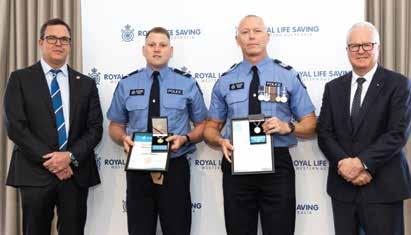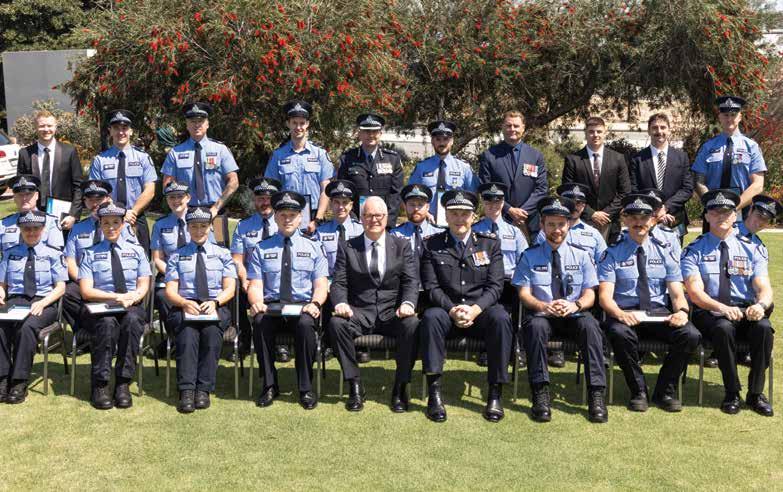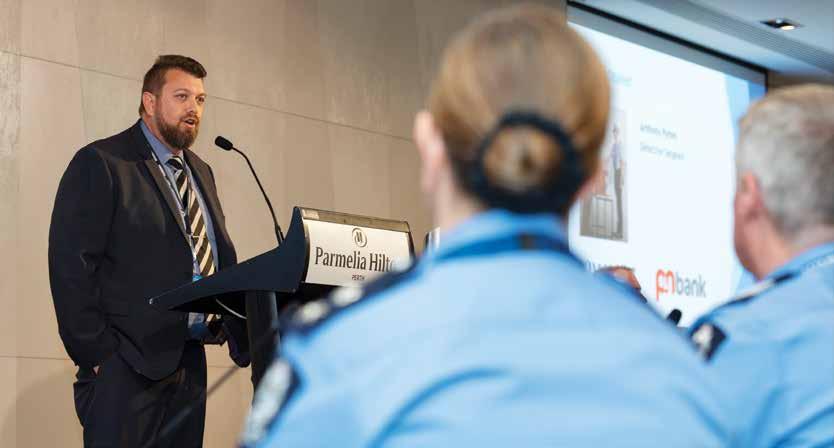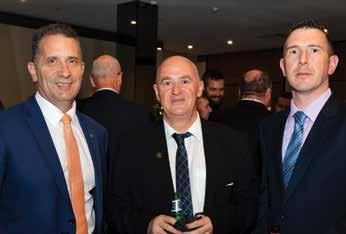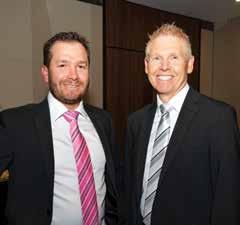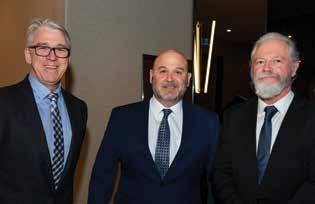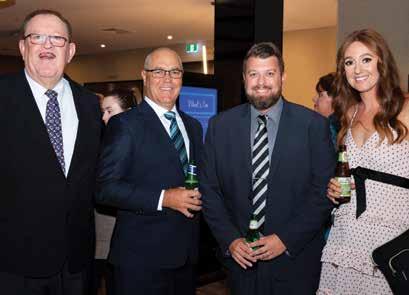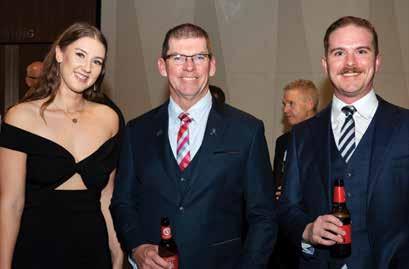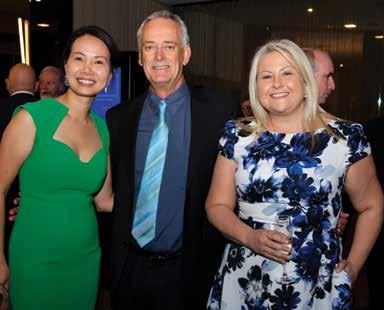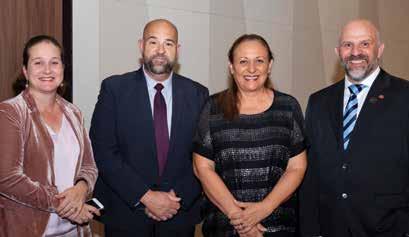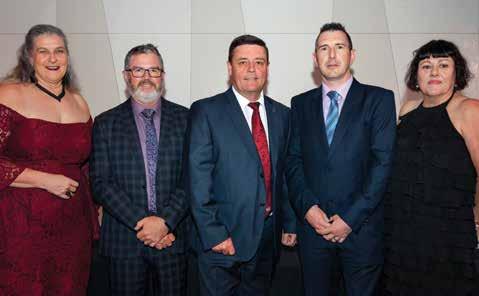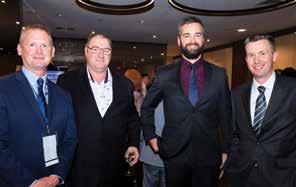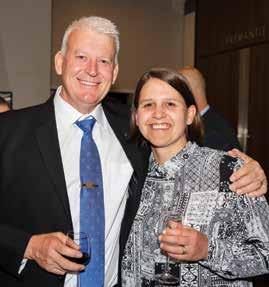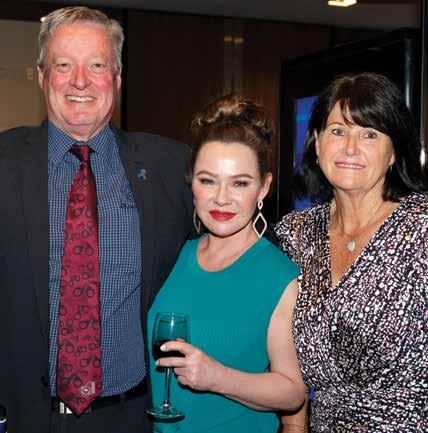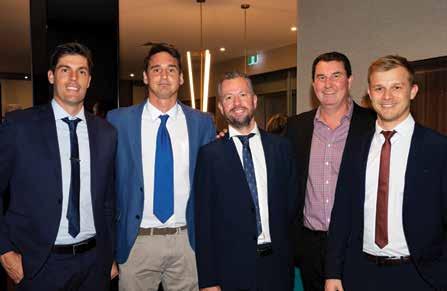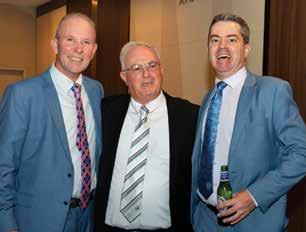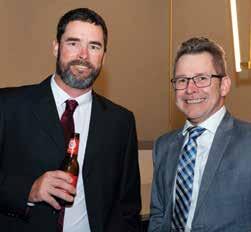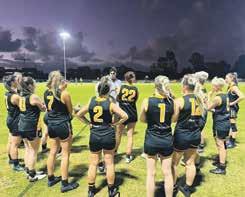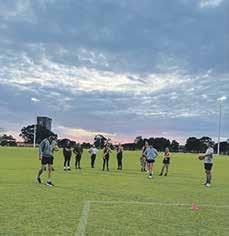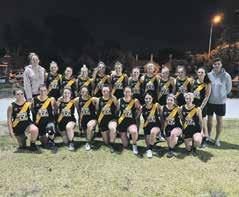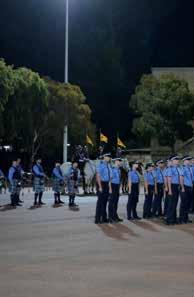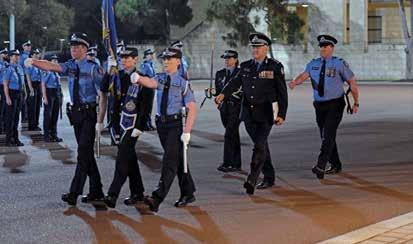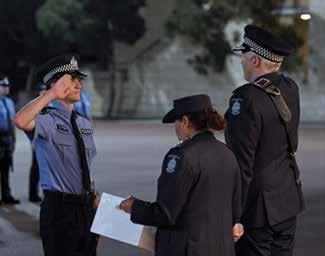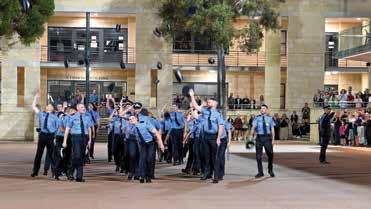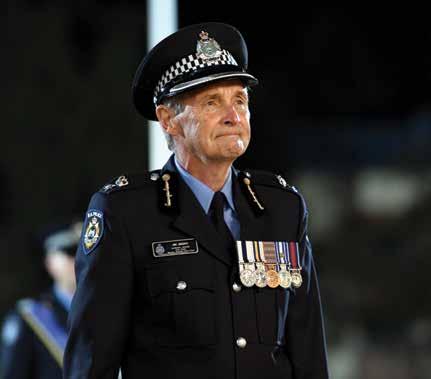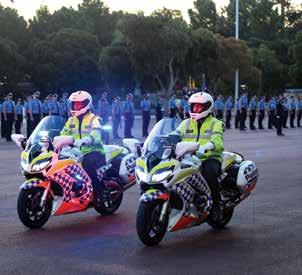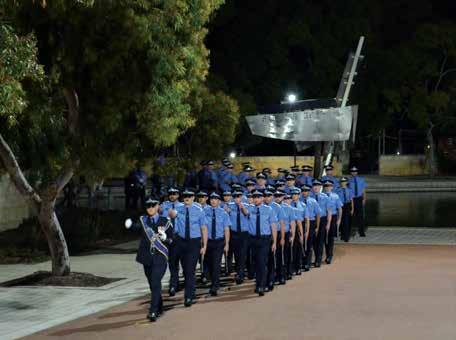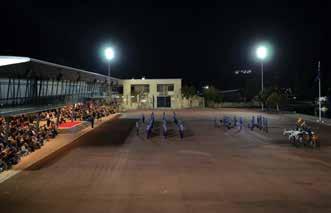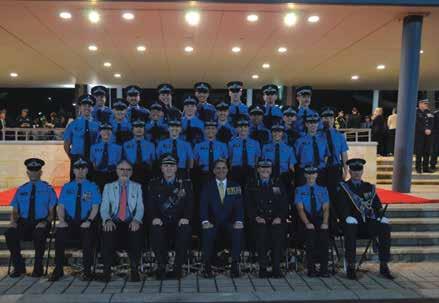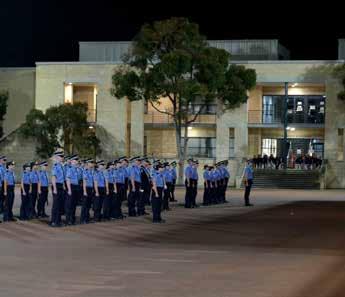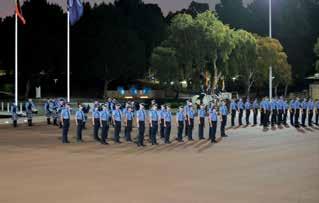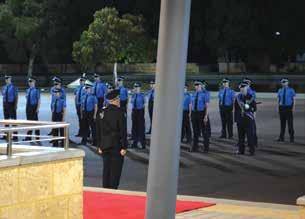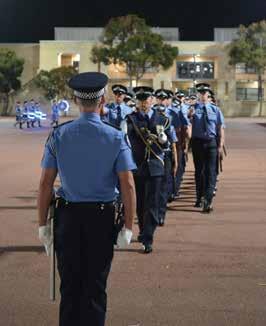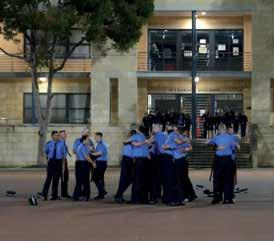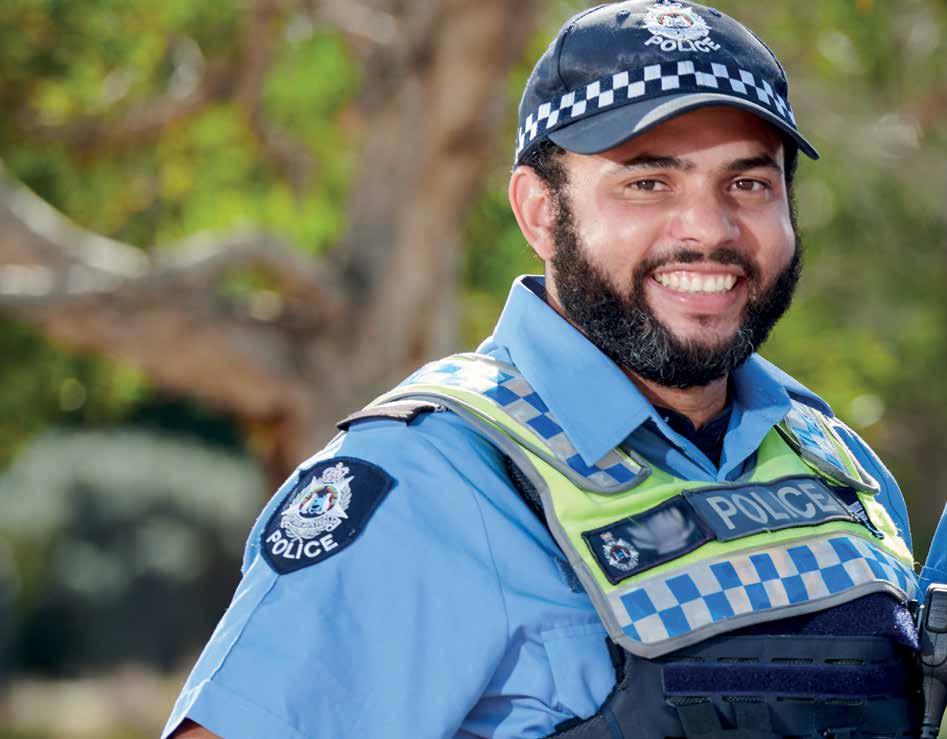WA POLICE UNION 86TH ANNUAL CONFERENCE MOTIONS ON NOTICE
1.0 CORPORATE
1.1 MANDURAH BRANCH
Conference directs the Board of Directors to make the necessary constitutional and other required changes to have the position of President removed and replaced with the position of Chief Executive Officer (CEO) and that the CEO is not a serving Police Officer.
Explanation
The “Leader” needs to be in a position that he /she can be seen as an equal to the Commissioner of Police (CoP) and not subservient. This will allow the “Leader” to have a position of strength without actual or inferred pressure being placed on him/her with regard to his/her future prospects within WAPOL.
Moved: Harry Russell Seconded: WITHDRAWN
1.2 EXECUTIVE MOTION
Conference directs the Board of Directors to amend Rule 7 of the Western Australian Police Union of Workers Constitution, Rules & By-Laws, specifically amending Rules 7.1 to 7.8 and adding Rule 7.9 as follows:
7 - POWERS AND DUTIES
7.1 Duties of the Board of Directors
The Board shall:
(a) establish the policies and strategic direction of the Union, provided that the Board may delegate the implementation and management of those policies and direction to the President, the Chief Executive Officer, and/ or Secretary;
(b) inquire into, report upon and make recommendations to the Annual Conference in all matters relevant to the conduct of the business of the Union;
(c) consider all matters or questions affecting the rights, welfare and interests of Members and take such action as may be deemed necessary in regard thereto;
(d) determine whether the President shall be employed, and if so, determine the conditions of employment and remuneration to be paid to the President;
(e) direct the labours of the President , the Chief Executive Officer, and Secretary including instructing the President to institute legal proceedings on behalf of the Union where appropriate;
(f) appoint a person to the position respective positions of Chief Executive Officer and Secretary of the Union and to determine the tenure, conditions of employment and remuneration of such appointment s provided this power may be delegated to the President ;
(g) employ such personnel as are necessary to carry out the administration of the Union provided this power may be delegated to the President and/ or the Chief Executive Officer (such appointments shall be according to
the tenure, conditions of employment and remuneration agreed by the Board);
(h) appoint such committees as may be deemed necessary;
(i) oversee the payment of any charges or expenses incidental to the function and promotion of the Union;
(j) protect the funds and assets of the Union from mismanagement and misappropriation; and
(k) appoint an Auditor in accordance with Rule 11.4 - Auditor;
(l) interpret any doubtful Rules; and
(m) determine in all matters where the Rules are silent.
7.2 Powers of Board of Directors
The Board of Directors shall have power:
(a) to make donations to any individual or organisation according to policy;
(b) to invest funds and to acquire, sell, lease, mortgage or otherwise dispose of any property for the purposes of the Union provided that the decision to do so is made by at least 10 Directors at an ordinary or a special board meeting and that all Directors were notified in writing of the proposal by registered mail, email or by personal delivery, at least 48 hours before the commencement of the meeting;
(c) to strike levies in order to provide for the Death Benefit and other contingencies;
(d) to make a grant from the funds of the Union for financial and/or legal assistance in accordance with Rule 11.6 - Financial and Legal Assistance;
(e) to grant leave of absence to any Board Member for a period not exceeding three months at any one time;
(f) to appoint any organisation or agent whose services may be deemed necessary for the carrying out of the Objects of the Union, provided that this power may be delegated to the President; and
(g) to delegate its authority as the Board may deem necessary.
7.3 Duties of the President (Chairperson)
The President shall:
(a) provide leadership to the Board of Directors, create board meeting agendas, ensure the Board stays focused on key duties, and be chairperson at all meetings of the Board and the Union to maintain order and administer these Rules impartially;
(b) oversee the control and supervision of the employees and agents of the Union;
(b) report to the Board of Directors on all matters impacting of the Objects of the Union and make appropriate recommendations to the Board of Directors;
(c) manage on behalf of the Board of Directors, provide direction to the Chief Executive Officer on the business and affairs of the Union in accordance with these Rules including, but not limited to, policy matters, liaison between the Board and employees the Chief Executive Officer, and media liaison;
(d) sign all Industrial Agreements, deeds or other instruments made on behalf of the Union by the Board;
POLICE NEWS DECEMBER 2022 26
(e) arrange in conjunction with the Chief Executive Officer contribute to the preparation of an annual budget for approval by the Board and monitor and control the budget so approved;
(f) as required authorise any extraordinary expenditure up to a level as predetermined by the Board each year;
(g) present a report on behalf of and as approved by the Board of Directors to each Annual Conference; and
(h) on behalf of the Board of Directors, delegate to a Director, employee, member, or agent , or the Chief Executive Officer all such tasks and duties as may be necessary to properly conduct the affairs, financial and otherwise, of the Union and to pursue its Objects .; and
(i) if employed, comply with the conditions and obligations within their contractual executive remuneration and employment contract.
7.4 Duties of the Senior Vice President and the Vice President
(a) During any absence or incapacity of the President, the Senior Vice President has the authority to act for and on behalf of the President, and when so acting, shall have all the rights, powers, duties and responsibilities of the President whether implied or expressed under these Rules.
(b) In the absence or incapacity of both the President and the Senior Vice President from any meeting the Vice President shall take the chair and shall have all the rights, powers, duties and responsibilities of the President, whether implied or expressed under these Rules.
(c) The Senior Vice President and the Vice President shall be members, ex officio, of each Committee established by the Board.
(d) The Senior Vice President, if employed, shall comply with the conditions and obligations within their contractual executive remuneration and employment contract.
(e) In the absence or incapacity of the Treasurer from any meeting, the Vice President shall have all the rights, powers, duties and responsibilities of the Treasurer, whether implied or expressed under these Rules.
7.5 Duties of the Treasurer
The Treasurer shall:
(a) keep a general oversight of the financial position of the Union;
(b) exercise proper control over the management of Union funds;
(c) ensure accounting records are kept in accordance with proper accounting principles and truly record and explain the financial transactions and financial position of the Union;
(d) present to each meeting of the Board appropriate accounting reports indicating the status of the funds and financial position of the Union, or other relevant reports as required by the Board;
(e) present to each Annual Conference an audited balance sheet of the assets and liabilities, a statement of the receipts and expenditure and a statement of the sources and application of funds of the Union;
(f) be entitled to inspect the books of the Union at any time and in the event of any irregularity shall immediately make a report to the President Board of Directors;
(g) be an ex officio member of each committee established by the Board of Directors;
(h) chair the Union’s Risk and Audit Committee;
(i) assist the President prepare a report for the Annual Conference;
(j) assist the President in the preparation of an annual budget as well as the monitoring and control of the approved budget; and
(k) be entitled to call for a full audit at any given time.; and
(l) be responsible for senior executive contracts including:
(i) establishment of contracts on commencement; and
(ii) establishing a reporting, recording mechanism that enables the Board to adequately monitor, review and report on the performance of the President, the Chief Executive Officer, and Secretary against their key positional descriptions and/or contractual obligations.
7.6 Duties of Finance Officials
Each Financial Official shall ensure the Union keeps and maintains accounting records as required by Rule 7.5 - Duties of the Treasurer and the Act.
7.7 Duties of the Secretary
The Secretary shall:
(a) in the conduct of the day to day business day-to-day administration functions of the Union, report to, be accountable to and take direction from the President Board of Directors;
(b) ensure he or she maintains a full knowledge of Union affairs and shall be competent to discharge all duties assigned to the Secretary from time to time by the President Board of Directors;
(c) keep all correspondence, documents, books and electronic records relating to the general business of the Union;
(d) arrange all meetings of the Union, the Board and Committees other than Branch meetings , including providing administrative support as required;
(e) attend all of the Board meetings and Annual Conferences of the Union in an advisory role only but shall not be allowed to vote;
(f) be the custodian of all moveable property of the Union and shall hand over to the Board all such property, books, documents and electronic records belonging to the Union within 24 hours after being requested to do so;
(g) ensure that the affairs of the Union are conducted to comply with the requirements of the Act;
(h) shall supply a copy of the provisions of the Act to each Director upon that Director’s election to office which relate to:
(i) the duties of Officers of organisations;
(i) shall produce all books, vouchers, or other documents and accounting records, no matter how stored, for inspection at Board meetings or to the Auditor when requested.;
(
j) shall attend Risk and Audit Committee meetings in an advisory role only, but shall not be allowed to vote.;
(k) shall deliver to the Registrar:
(i) Balance sheet of the assets and liabilities of the Union as audited; and
(ii) A statement of receipts and expenditure of the Union for the financial year; and
(iii) Cash flow statement of the Union for the financial year ; and
(l) report to the Board of Directors on all matters impacting of the Objects of the Union and make appropriate recommendations to the Board of Directors.
7.8 Duties of the Finance Manager
The Finance Manager shall:
(a) Keep keep all accounts relating to the general business of the Union;
(b) Overview overview the receipt of all monies on behalf of the Union and shall see that such monies are paid promptly in to into the Union accounts at a reputable financial institution chosen by the Board;
(c) shall hand over to the Board all such monies belonging to the Union within 24 hours after being requested to do so;
(d) Shall supply a copy of the accounting records of the Union upon the Director’s election to office; and
POLICE NEWS DECEMBER 2022 27
(e) Shall produce all accounting records, no matter how stored, for inspection at Board meetings or to the Auditor when requested; and
(f) Shall attend Risk and Audit Committee meetings in an advisory role only, but shall not be allowed to vote.
7.9 Duties of the Chief Executive Officer
The Chief Executive Officer shall:
(a) provide leadership to and oversee the management of the employees and agents of the Union;
(b) take counsel and direction from the President and work collaboratively towards the Objects of the Union;
(c) in conjunction with the Board, establish the strategic direction of the Union and focus the efforts of the Senior Executive and the employees towards these goals;
(d) on receiving strategic direction from the President on behalf of the Board of Directors, manage the business and affairs of the Union in accordance with these Rules including, but not limited to, policy matters, liaison between the President and employees, and media liaison;
(e) arrange the preparation of an annual budget, in conjunction with the President, for approval by the Board and to monitor and control the budget so approved;
(f) ensures that all expenditure is authorised in accordance with respective Board approved policy or via the Board of Directors;
(g) as required authorise any extraordinary expenditure incurred by other Executive members, up to a level as predetermined each year by the Board of Directors;
(h) in collaboration with the Secretary and the President on behalf of the Board of Directors, create or maintain the appropriate level of policies or manuals to ensure the utilisation of equipment, finances and human resources are utilised appropriately (eg vehicle use policy etc);
(i) work collaboratively with the Secretary to ensure that the affairs of the Union are conducted to comply with the requirements of:
(i) the Act;
(ii) the Work Health & Safety Act; and
(iii) any relevant legislation covering insurance, taxation, human resource and/or similar business risks;
(j) delegate to an employee, member or agent all such tasks and duties as may be necessary to properly conduct the affairs, financial and otherwise, of the Union and to pursue its Objects;
(k) report to the Board of Directors on all matters impacting of the Objects of the Union and make appropriate recommendations to the Board of Directors; and
(l) present a report to each Annual Conference.
Explanation
The Constitution enables the Members to democratically elect 15 Members from the ranks of police officers to sit on the Board of Directors to advocate and represent the membership. Since the 2010 Constitutional change, WAPU has followed a United States’ model of vesting the two roles – the Chairperson of the Board and the Chief Executive Officer (CEO) – in the one person being the President which is elected from the Board of Directors by the Directors. However, the Australian Institute of Company Directors point out “…a structure that was highly suitable at one point in time becomes less suitable, or completely unsuitable, as the organisation evolves”.
WAPU is increasingly operating in a very complex economic, industrial and political environment, which is proving to be beyond the scope of any
individual. The Union needs to ensure it is structured to be responsive to the Members and meeting the Objects of the Union. The Membership of WAPU also continues to grow. Between 2012 and 2021, WAPU has consistently enjoyed the membership of between 96 and 98 percent of police officers employed by the Western Australia Police Force (WAPF). In 2012, WAPF employed 5,751 officers (including both police officers and Police Auxiliary Officers), whereas in 2021 WAPF employed 7,272 officers (including both police officers and Police Auxiliary Officers), representing an increase of 26.4 percent – or an equivalent of another quarter of the Membership.
Contrast to this US-based model is the alternative Australian and British model, advocated by the Australian Institute of Company Directors, which separates the two roles – Chairperson of the Board and Chief Executive Officer (CEO) – and vesting these roles in two separate people. This model in application to WAPU, will see the President as the Chairperson of the Board who focuses on providing the democratic leadership to the Board of Directors who set the strategic direction and governance for the organisation on behalf of the Members, while the Chief Executive Officer provides the leadership and management to the operational managers and employees in implementing and conducting the day-to-day business as directed by the Board on behalf of the Members.
These amendments to Rule 7 – Power and Duties of the Constitution, which includes introducing Rule 7.9, will provide specific duties for the two roles –Chairperson of the Board and Chief Executive Officer (CEO) – and will:
1. enable the Board of Directors to employ a suitably qualified person with extensive corporate experience into the role of Chief Executive Officer to enhance the operational leadership and management of the Union;
2. enable the President to focus on providing strategic leadership to the Board to provide direction to the Chief Executive Officer, and maintain the President’s role as “principal executive officer” under the Industrial Relations Act 1979; and
3. enable both the President and the Chief Executive Officer to work collaboratively on a range of strategic, economic, industrial and political issues.
The key drivers behind this motion are:
1. Professionalism: At present the current constitution requires a police officer, duly elected by the Board, to be President, potentially with limited business acumen or management skills, to run a $9.6m Not-ForProfit organisation as a CEO, with its accompanying legal and financial obligations. Currently, there is no requirement for the President to have the necessary knowledge, experience, or qualifications prior to nominating for the position nor to demonstrate understanding of the complex legislative and industrial nuances associated with the hiring and firing of staff, administration, complex insurance, legal or industrial matters and managing the finances of the $9.6m budget within relevant legislative oversight. Incumbents in similar Not-For-Profit organisations require an MBA equivalent level qualification or extensive experience in this field where they have demonstrated adherence to the legal obligations under various Federal and State level legislative instruments. WAPU have in recent years been subject to various third-party legal directions and/or obligations.
2. Governance: The proposed changes provide for the separation of powers between the role of the President and the Chief Executive Officer. The governance role of the Board of Directors is to ask questions of
POLICE NEWS DECEMBER 2022 28
management of the organisation on behalf of the membership, and to challenge management on issues for the purpose of ensuring accountability, transparency, and minimising the organisation’s risk exposure. It is an unfair expectation for the President to chair and facilitate the Board of Directors’ meetings on the one hand, whilst simultaneously being held to account for the proper day-to-day management of the organisation. In effect, the current structure gives total control to the President. The President in their chairperson function has the capability to stymie debate by the Board of Directors and prevent questioning of their chief executive officer function. It is therefore an unsuitable model for the future of the Union. The proposed model vest separate powers in two independent positions, both of whom will be obligated to report to the Board of Directors and to Annual Conference on all matters impacting of the Objects of the Union.
Moved: Lindsay Garratt Seconded: Chad Butler-Henderson CARRIED
1.3 EXECUTIVE MOTION
Conference directs the Board of Directors to amend Rule 7.1 to 7.8 of the Western Australian Police Union of Workers Constitution, Rules & By-Laws as follows:
7 - POWERS AND DUTIES
7.1 Duties of the Board of Directors
The Board shall:
(a) establish the policies and strategic direction of the Union, provided that the Board may delegate the implementation and management of those policies and direction to the President and/or Secretary;
(b) inquire into, report upon and make recommendations to the Annual Conference in all matters relevant to the conduct of the business of the Union;
(c) consider all matters or questions affecting the rights, welfare and interests of Members and take such action as may be deemed necessary in regard thereto;
(d) determine the conditions of employment and remuneration to be paid to the President and Senior Vice President ;
(e) direct the labours of the President and Secretary including instructing the President to institute legal proceedings on behalf of the Union where appropriate;
(f) appoint a person to the position of Secretary (General Manager) of the Union and to determine the tenure, conditions of employment and remuneration of such appointment provided this power may be delegated to the President ;
(g) employ such personnel as are necessary to carry out the administration of the Union provided this power may be delegated to the President and/ or the Secretary (such appointments shall be according to the tenure, conditions of employment and remuneration agreed by the Board);
(h) appoint such committees as may be deemed necessary;
(i) oversee the payment of any charges or expenses incidental to the function and promotion of the Union;
(j) protect the funds and assets of the Union from mismanagement and misappropriation; and
(k) appoint an Auditor in accordance with Rule 11.4 - Auditor;
(l) interpret any doubtful Rules; and
(m) determine in all matters where the Rules are silent.
7.2 Powers of Board of Directors
The Board of Directors shall have power:
(a) to make donations to any individual or organisation according to policy;
(b) to invest funds and to acquire, sell, lease, mortgage or otherwise dispose of any property for the purposes of the Union provided that the decision to do so is made by at least 10 Directors at an ordinary or a special board meeting and that all Directors were notified in writing of the proposal by registered mail, email or by personal delivery, at least 48 hours before the commencement of the meeting;
(c) to strike levies in order to provide for the Death Benefit and other contingencies;
(d) to make a grant from the funds of the Union for financial and/or legal assistance in accordance with Rule 11.6 - Financial and Legal Assistance;
(e) to grant leave of absence to any Board Member for a period not exceeding three months at any one time;
(f) to appoint any organisation or agent whose services may be deemed necessary for the carrying out of the Objects of the Union, provided that this power may be delegated to the President; and
(g) to delegate its authority as the Board may deem necessary.
7.3 Duties of the President
The President shall:
(a) be chairperson at all meetings of the Board and the Union to maintain order and administer these Rules impartially;
(b) oversee the control and supervision management of the employees and agents of the Union, with the exception of the Secretary position;
(c) manage the business and affairs of the Union in accordance with these Rules including, but not limited to, policy matters, liaison between the Board and employees, and media liaison;
(d) sign all Industrial Agreements, deeds or other instruments made on behalf of the Union by the Board;
(e) arrange in conjunction with the Secretary contribute to the preparation of an annual budget for approval by the Board and monitor and control the budget so approved;
(f) as required authorise any extraordinary expenditure up to a level as predetermined by the Board each year;
(f) in conjunction with the Board, establish the Strategic Direction of the Union and focus the efforts of the Senior Executive and the employees towards these goals;
(g) present a report to each Annual Conference; and
(h) delegate to a Director, employee, member or agent all such tasks and duties as may be necessary to properly conduct the affairs, financial and otherwise, of the Union and to pursue its Objects.
(i) Comply with the conditions and obligations within their contractual executive remuneration and employment contract.
7.4 Duties of the Senior Vice President and the Vice President
(a) During any absence or incapacity of the President, the Senior Vice President has the authority to act for and on behalf of the President, and when so acting, shall have all the rights, powers, duties and responsibilities of the President whether implied or expressed under these Rules.
(b) In the absence or incapacity of both the President and the Senior Vice President from any meeting the Vice President shall take the chair and shall have all the rights, powers, duties and responsibilities of the President, whether implied or expressed under these Rules.
(c) The Senior Vice President and the Vice President shall be members, ex officio, of each Committee established by the Board.
POLICE NEWS DECEMBER 2022 29
(d) The Senior Vice President will comply with the conditions and obligations within their contractual executive remuneration and employment contract.
7.5 Duties of the Treasurer
The Treasurer shall:
(a) keep a general oversight of the financial position of the Union;
(b) exercise proper control over the management of Union funds;
(c) ensure accounting records are kept in accordance with proper accounting principles and truly record and explain the financial transactions and financial position of the Union;
(d) present to each meeting of the Board appropriate accounting reports indicating the status of the funds and financial position of the Union, or other relevant reports as required by the Board;
(e) present to each Annual Conference an audited balance sheet of the assets and liabilities, a statement of the receipts and expenditure and a statement of the sources and application of funds of the Union;
(f) be entitled to inspect the books of the Union at any time and in the event of any irregularity shall immediately make a report to the President Board;
(g) be an ex officio member of each committee established by the Board;
(h) chair the Union’s Risk and Audit Committee;
(i) assist the President and/or Secretary prepare a report for the Annual Conference;
(j) assist the President and/or Secretary in the preparation of an annual budget as well as the monitoring and control of the approved budget; and
(k) be entitled to call for a full audit at any given time ; and
(l) be responsible for senior executive contracts including:
(i) establishment of contracts on commencement; and
(ii) establishing a reporting, recording mechanism that enables the board to adequately monitor, review and report on the performance of Senior Executive against their key positional descriptions and/ or contractual obligations.
7.6 Duties of Finance Officials
Each Financial Official shall ensure the Union keeps and maintains accounting records as required by Rule 7.5 - Duties of the Treasurer and the Act.
7.7 Duties of the Secretary (General Manager)
The Secretary shall:
(a) in the conduct of the day to day business day-to-day administrative functions of the Union, report to, be accountable to and take direction from the President Board;
(b) take counsel and direction from the President; in matters external to the Secretaries role and function and to work collaboratively towards the Objects of the Union
(c) arrange the preparation of an annual budget, in conjunction with the President, for approval by the Board and to monitor and control the budget so approved;
(d) ensures that all expenditure is authorised in accordance with respective board approved policy or via the Board;
(e) as required authorise any extraordinary expenditure incurred by other Executive members, up to a level as predetermined by the Board each year;
(f) in conjunction with the Board and /or the President create or maintain the appropriate level of Union policies or manuals to ensure the utilisation of union equipment, finances and human resources are utilised appropriately, (vehicle use policy etc)
(b)(g) ensure he or she maintains a full knowledge of Union affairs and shall be competent to discharge all duties assigned to the Secretary from time to time by the President;
(c)(h) keep all correspondence, documents, books and electronic records relating to the general business of the Union;
(d)(i) arrange all meetings of the Union, the Board and Committees other than Branch meetings;, including providing administrative support in managing
(i) inward, outward correspondence;
(ii) minute compilation; and
(iii) other administrative or finance support as required
(e)(j) attend all of the Board meetings and Annual Conferences of the Union in an advisory role only but shall not be allowed to vote;
(f)(k) be the custodian of all moveable property of the Union and shall hand over to the Board all such property, books, documents and electronic records belonging to the Union within 24 hours after being requested to do so;
(g)(l) ensure that the affairs of the Union are conducted to comply with the requirements of the Act;
(i) the Act;
(ii) the Work Health & Safety Act; and
(iii) any relevant legislation covering insurance, taxation, human resource and/or similar business risks;
(h)(m) shall supply a copy of the provisions of the Act to each Director upon that Director’s election to office which relate to:
i) the duties of Officers of organisations;
(i)(n) shall produce all books, vouchers, or other documents and accounting records, no matter how stored, for inspection at Board meetings or to the Auditor when requested.
j)(o) shall attend Risk and Audit Committee meetings in an advisory role only, but shall not be allowed to vote.
k)(p)shall deliver to the Registrar:
i) Balance sheet of the assets and liabilities of the Union as audited; and
ii) A statement of receipts and expenditure of the Union for the financial year; and
iii) Cash flow statement of the Union for the financial year.
7.8 Duties of the Finance Manager
The Finance Manager shall:
a) Keep all accounts relating to the general business of the Union;
b) Overview the receipt of all monies on behalf of the Union and shall see that such monies are paid promptly in to into the Union accounts at a reputable financial institution chosen by the Board;
c) shall hand over to the Board all such monies belonging to the Union within 24 hours after being requested to do so;
d) Shall supply a copy of the accounting records of the Union upon the Director’s election to office; and
e) Shall produce all accounting records, no matter how stored, for inspection at Board meetings or to the Auditor when requested;
f) Shall attend Risk and Audit Committee meetings in an advisory role only, but shall not be allowed to vote.
Explanation
[At Item 1.14 the Commissioned Officer’s Branch passed a motion to alter Rule 13, however the presentation of the motion within the minutes contained
POLICE NEWS DECEMBER 2022 30
inadvertent formatting issues. To enable the motion to be progressed to Annual Conference it is presented here in compliant format.]
This amendment is necessary and designed to re-create the separation of powers between the President and Secretary (General Manager) positions. The employment of a suitably qualified person with extensive corporate experience will enhance the management and administrative functions of the Union.
In 2010 Constitutional changes occurred which resulted in the position of Union General Manager being downgraded to Secretary, with duties and responsibilities removed from this position and incorporated in the President’s role. In effect the President became accountable for all human resource and administrative responsibilities within WAPU in addition to his strategic, political and media responsibilities.
This motion intends to revert the current Constitution, back to a constitution similar to the 2009 Constitution. This will provide a separation of powers within the WAPU Senior Executive, with the President being the public profile and spokesperson of the Union and the General Manager being the qualified business manager; whom will be responsible for the administrative (human resource and legal) issues surrounding the management and employment of WAPU staff, industrial and financial matters.
The key drivers behind this motion are:
1. Professionalism: At present the current constitution requires a police officer, duly elected by the Board, to be President, potentially with limited business acumen or management skills, to run a $9.6m Not-ForProfit organisation as a CEO, with its accompanying legal and financial obligations. Currently, there is no requirement for the President to have the necessary knowledge, experience, or qualifications prior to nominating for the position nor to demonstrate understanding of the complex legislative and industrial nuances associated with the hiring and firing of staff, administration, complex insurance, legal or industrial matters and managing the finances of the $9.6m budget within relevant legislative oversight. Incumbents in similar Not-For-Profit organisations require an MBA equivalent level qualification or extensive experience in this field where they have demonstrated adherence to the legal obligations under various Federal and State level legislative instruments. WAPU have in recent years been subject to various third-party legal directions and/or obligations.
2. Governance: Previously the General Manager, whilst reporting to President was engaged and had their duties directed by the Board. The current Constitution permits the employment of the Secretary to be conducted by the President and requires the Secretary to be performance managed and take direction as to their duties, from the President, not the Board. In effect the Board went from a position of good governance where two key positions were responsible for two independent functions within the Union. To one position having total control over the reporting to the Board of all aspects of Union business.
3. Transparency and financial accountability: The remuneration and benefits paid to the Senior Executive have become highly classified and prevented from being shared with the membership both contractually and via Board confidentiality. An August 2022 Board resolution will require the Senior Executive (Directors only) payments to be declared and itemised in the Annual Report. Along with the growth of the President
salary, Union Senior Executive have not been constrained by the effects of the State Wages Policy regarding their annual pay reviews. By having open and transparent pay rates and rises, the Board of Director must answer to the greater membership as to why pay rises are not in line with the pay rises afforded the greater membership or justify the wage for the Senior Executive positions.
This initiative would potentially be cost neutral at worst or cost positive dependent on roles and responsibilities and Board approvals. The change will enable a balanced and independent representation of various aspects of the business to the Board, whilst empowering each management stream to represent their responsibilities to the board, thus providing greater accountability to the greater membership.
Moved: Gary Lewis
1.4 EXECUTIVE MOTION
Seconded:
Conference directs the Board of Directors to amend Rule 7.2 and Rule 7.3 of the Western Australian Police Union of Workers Constitution, Rules & By-Laws as follows:
7 - POWERS AND DUTIES
….
7.2 Powers of Board of Directors
The Board of Directors shall have power:
(a) to make donations to any individual or organisation according to policy;
(b) to invest funds and to acquire, sell, lease, mortgage or otherwise dispose of any property for the purposes of the Union provided that the decision to do so is made by at least 10 Directors at an ordinary or a special board meeting and that all Directors were notified in writing of the proposal by registered mail, email or by personal delivery, at least 48 hours before the commencement of the meeting;
(c) to strike levies in order to provide for the Death Benefit and other contingencies;
(d) to make a grant from the funds of the Union for financial and/or legal assistance in accordance with Rule 11.6 - Financial and Legal Assistance;
(e) to grant leave of absence to any Board Member for a period not exceeding three months at any one time;
(f) to appoint any organisation or agent whose services may be deemed necessary for the carrying out of the Objects of the Union, provided that this power may be delegated to the President; and
(g) to delegate its authority as the Board may deem necessary ; and
(h) to appoint one Director to be chairperson at any meeting of the Board and the Union to maintain order and administer these Rules impartially.
7.3 Duties of the President
The President shall:
(a) be chairperson at all meetings of the Board and the Union to maintain order and administer these Rules impartially;
(b) The proposed changes provide the separation of powers of the president as the chief executive off
Explanation
The proposed changes provide for the separation of powers between the position of the President as the Chief Executive Officer and the role of Chairperson of the Board.
POLICE NEWS DECEMBER 2022 31
WITHDRAWN
1.5
The governance role of the Board of Directors is to ask questions of management of the organisation on behalf of the membership, and to challenge management on issues for the purpose of ensuring accountability, transparency, and minimising the organisation’s risk exposure. Through advice from the Australian Institute of Company Directors, it is evident that the President’s dual function can be in conflict placing the President in an untenable position. It is an unfair expectation for the President to chair and facilitate the Board of Directors’ meetings on the one hand, whilst simultaneously being held to account for the proper day-to-day management of the organisation back to the Board.
The proposed model separates the Presidents role as the effective CEO function responsible to the Board for the day-to-day management of the organisation, from the Chairperson of the Board function responsible for facilitating discussion and the democratic debate between Directors acting in the best interest of the Membership.
This model of separating the two functions, is evident in State Parliament where the Premier is not vested with the Speaker of the House duties. The Speaker of the House is elected by the members of the house, with the function “…to regulate debate and to ensure that the proceedings are carried out in accordance with the standing orders of the house and established parliamentary custom”.1
It should be noted that the WAPU’s Standing Order, empowered by Rule 9(a) of the Western Australian Police Union of Workers Constitution, Rules & ByLaws, talks to the role of Chairperson or Chair, but not the role of President as performing that role.
1 https://www.parliament.wa.gov.au/Parliament/memblist.nsf/ ScreenMembersWPolOffHoldLA
“Branch Officer Bearers” means those Members elected by Branch Members to the office of Branch President, Branch Vice President, Branch Secretary or other office in a Branch in accordance with Rule 6.4 - Branch Representation.
“Commission” means the Western Australian Industrial Relations Commission.
“Director” means a Member elected to the Board in accordance with Rule 6 - Government of the Union.
“Director - Elect” means a Member elected to the Board in accordance with Rule 6 - Government of the Union who has not yet commenced office.
“Finance Official” means a person who by virtue of their engagement by the Union in a finance related role or their election to the office of Treasurer are entitled to participate directly in the financial management of the Union.
“Journal “means the “Police News” or such other newsletter published by the Union.
“Life Member” means a person on whom life membership has been conferred in accordance with Rule 5.3 - Life Membership.
“Member” means a financial member of the Union.
“Metropolitan Region, North (Kimberley/Pilbara) Region, Central (Mid West-Gascoyne/Wheatbelt) Region, East (Goldfields-Esperance) Region and South (South West/Great Southern) Region” mean respectively the regions the boundaries of which shall be determined by the Annual Conference.
“Objects” means the goals and purposes of the Union set out in Rule 4Objects.
“Officers” includes Directors, the Secretary, Branch Office Bearers and Branch Delegates.
“Ordinary Member” means a person who is a member by virtue of Rule 5.1 - Ordinary Membership.
“President”, “Senior Vice President”, “Vice President” and “Treasurer” mean the Director appointed to such office by the Board in accordance with Rule 6 - Government of the Union.
Moved: Lindsay Garratt
Seconded: WITHDRAWN
EXECUTIVE MOTION
Conference directs the Board to alter Rule 3 of the Constitution as below.
Current Rule 3 3 - INTERPRETATION
In these Rules, unless the contrary intention appears –
“Act” means the Industrial Relations Act 1979 (WA) as amended;
“Alteration” for the purpose of these Rules includes an amendment, addition to, variation, rescission or substitution of a rule or rules.
“Annual Audit” means the annual audit conducted by the Auditor in accordance with Rule 11.4 - Auditor.
“Annual Conference” means the annual meeting of Directors, Directors-Elect and Branch Delegates held in accordance with Rule 8.1 - Annual Conference.
“Auditor” means the person appointed by the Board in accordance with Rule 11.4 - Auditor to act as the auditor of the Union.
“Board” means the Board of Directors established in accordance with Rule 6 - Government of the Union
“Branch” means a branch of the Union formed by the Board in accordance with Rule 6.4 - Branch Representation.
“Branch Delegate” means a Member appointed in accordance with Rule 8.1 - Annual Conference to represent a Branch at the Annual Conference.
“Register of Members” means the register of Members and Officers maintained by the Secretary in accordance with Rule 5.4 - Application for Membership. Any person eligible to be an Ordinary or Retired Member may apply to the Board for membership of the Union, and the Board shall have the power to accept or reject such applications; provided that any applicant whose application for membership is rejected by the Board shall have the right of appeal to the next Annual Conference whose decision shall be final.
“Registered Office” means the office of the Union determined by the Board in accordance with Rule 2 - Registered Office.
“Registrar” means the Registrar appointed in accordance with the Industrial Relations Act 1979 (WA)
“Retired Member” means a person who is a Member by virtue of Rule 5.2Retired Membership.
“Returning Officer” means a person appointed in accordance with Rule 12.2 - Appointment of Returning Officer to oversee an election under these Rules or in accordance with Rule 10 - Referendums to oversee a referendum under these Rules.
“Scrutineer” means a Member nominated by a candidate in accordance with Rule 12.16 - Scrutineers to scrutinize an election under these Rules.
“Secretary” means the person appointed by the Board to act in that capacity from time to time or any person approved by the Board to hold such position in an acting capacity.
“Union” means the Western Australian Police Union of Workers.
Proposed Rule 3
3 - INTERPRETATION
In these Rules, unless the contrary intention appears –
POLICE NEWS DECEMBER 2022 32
“Act” means the Industrial Relations Act 1979 (WA) as amended; “Alteration” for the purpose of these Rules includes an amendment, addition to, variation, rescission or substitution of a rule or rules.
“Annual Audit” means the annual audit conducted by the Auditor in accordance with Rule 11.4 - Auditor.
“Annual Conference” means the annual meeting of Directors, Directors-Elect and Branch Delegates held in accordance with Rule 8.1 - Annual Conference.
“Auditor” means the person appointed by the Board in accordance with Rule 11.4 - Auditor to act as the auditor of the Union.
“Board” means the Board of Directors established in accordance with Rule 6 - Government of the Union
“Branch” means a branch of the Union formed by the Board in accordance with Rule 6.4 - Branch Representation.
“Branch Delegate” means a Member appointed in accordance with Rule 8.1 - Annual Conference to represent a Branch at the Annual Conference.
“Branch Officer Bearers” means those Members elected by Branch Members to the office of Branch President, Branch Vice President, Branch Secretary or other office in a Branch in accordance with Rule 6.4 - Branch Representation.
“Commission” means the Western Australian Industrial Relations Commission.
“Director” means a Member elected to the Board in accordance with Rule 6 - Government of the Union.
“Director - Elect” means a Member elected to the Board in accordance with Rule 6 - Government of the Union who has not yet commenced office.
“Finance Official” means a person who by virtue of their engagement by the Union in a finance related role or their election to the office of Treasurer are entitled to participate directly in the financial management of the Union.
“Journal “means the “Police News” or such other newsletter published by the Union.
“Life Member” means a person on whom life membership has been conferred in accordance with Rule 5.3 - Life Membership.
Member” means a financial member of the Union.
“Merit” (specific to Rule 13) means the complaint must be specific, provide sufficient detail, be linked to the grounds outlined in Rule 13 (a), and on the face of it warrant penalty, not trivial or vexatious.
“Metropolitan Region, North (Kimberley/Pilbara) Region, Central (Mid West-Gascoyne/Wheatbelt) Region, East (Goldfields-Esperance) Region and South (South West/Great Southern) Region” mean respectively the regions the boundaries of which shall be determined by the Annual Conference.
“Objects” means the goals and purposes of the Union set out in Rule 4Objects.
“Officers” includes Directors, the Secretary, Branch Office Bearers and Branch Delegates.
“Ordinary Member” means a person who is a member by virtue of Rule 5.1 - Ordinary Membership.
“President”, “Senior Vice President”, “Vice President” and “Treasurer” mean the Director appointed to such office by the Board in accordance with Rule 6 - Government of the Union.
“Register of Members” means the register of Members and Officers maintained by the Secretary in accordance with Rule 5.4 - Application for Membership. Any person eligible to be an Ordinary or Retired Member may apply to the Board for membership of the Union, and the Board shall have the power to accept or reject such applications; provided that any applicant whose application for membership is rejected by the Board shall have the right of appeal to the next Annual Conference whose decision shall be final.
“Registered Office” means the office of the Union determined by the Board in accordance with Rule 2 - Registered Office.
“Registrar” means the Registrar appointed in accordance with the Industrial Relations Act 1979 (WA)
“Retired Member” means a person who is a Member by virtue of Rule 5.2Retired Membership.
“Returning Officer” means a person appointed in accordance with Rule 12.2 - Appointment of Returning Officer to oversee an election under these Rules or in accordance with Rule 10 - Referendums to oversee a referendum under these Rules.
“Scrutineer” means a Member nominated by a candidate in accordance with Rule 12.16 - Scrutineers to scrutinize an election under these Rules.
“Secretary” means the person appointed by the Board to act in that capacity from time to time or any person approved by the Board to hold such position in an acting capacity.
“Union” means the Western Australian Police Union of Workers.
Explanation
Rule 3 relates to interpretations and definitions of words and terms within the Constitution, in managing matters pertaining to the constitution, specifically Rule 13 matters it has become evident the term “merit” has no definition.
Moved: Dave Flaherty Seconded: Scott Sulley
CARRIED
1.6 EXECUTIVE MOTION
Conference directs the Board of Directors to amend Rule 4 of the Western Australian Police Union of Workers Constitution, Rules & By-Laws as follows:
4 - OBJECTS
The objects of the Union shall be:
(a) to ensure the long-term sustainability of the Union in the best interests of the Members;
(ab) to uphold the rights and to protect and foster the best interests of Members industrially and otherwise;
(b c) to secure the participation and influence of Members in the administration, development and planning of policing;
(cd) to advance, enhance and promote the profession of policing in the best interests of Members;
(de) to provide means for combined action in matters affecting Members;
(e f ) to consider, and if appropriate endeavour to obtain, redress or settlement of any grievances or complaints affecting Members;
(fg ) to take the steps necessary to secure satisfactory industrial conditions for Members;
(
gh) to encourage esprit-de-corps among members of the Union;
(hi) to raise funds by means of fees, contributions, subscriptions, levies and other forms of income and investment for the purpose of carrying out the Objects of the Union;
(ij) render financial and other assistance in defending and maintaining the interests, privileges and rights of Members; and
(
jk) to do all such other things as the Union may from time to time deem incidental or conducive to the attainment of the Objects of the Union.
Explanation
On review of the Objects of the Union with the Australian Institute of Company Directors, there was significant focus on the individual Members and little if any on the long-term sustainability of the Union, which is ultimately in the best interest of the Membership.
POLICE NEWS DECEMBER 2022 33
This motion seeks to correct that omission to make explicit that Directors must consider the long-term sustainability of the Union in decision-making.
Moved: Lindsay Garratt Seconded: Glenn Wishart CARRIED
1.7 PAO PROPERTY BRANCH
Conference directs a change of the Western Australia Police Union constitution part 6.1 clause (b) which states: The Board shall comprise 15 Directors, of which 11 who hold office shall be from the Metropolitan Region and one each from the Northern (Kimberley/Pilbara) Region, Central (Mid WestGascoyne/Wheatbelt) Region, Eastern (Goldfields-Esperance) Region and Southern (South West/Great Southern) Region. To create an additional Director, designated Police Auxiliary Officer (PAO) position on the board to represent Police Auxiliary Officers, the PAO Industrial Agreement and promote PAO interests.
Explanation
The WA Police Union represents both the Police Officer Industrial Agreement and the Police Auxiliary Officer Industrial Agreement. These are two completely separate agreements with vast differences. Police Auxiliary Officers do not have specific representation and rely on police officers to support their claims. As the Industrial Agreement’s differ quite dramatically there are many aspects of the Police Auxiliary Officer Industrial Agreement that police officers are simply unaware of. It would be beneficial for our members to have a representative that has comprehensive knowledge not only the Police Auxiliary Officer Industrial Agreement, but also of the issues that face Auxiliary Officers on a day to day basis. This representative will actively work to promote PAO interests and improve the conditions and issues that PAOs currently face. A complete understanding of PAO difficulties would assist the PAO membership in achieving fairness in the workplace. Placing a designated PAO on the board would also assist with increasing union membership in those ranks, as PAOs will see themselves represented and on equal footing with police officers within WAPU.
Moved: Lisa Little Seconded: Brock Downing CARRIED
1.8 EXECUTIVE MOTION
Conference directs the Board of Directors to alter Rule 6.1(d) as below.
Current Rule 6.1(d)
(1) be a Member (other than a Retired Member or a Life Member who has retired);
(2) be free of any debts or arrears to the Union;
(3) have attended at least four branch meetings in the preceding 12 months;
(4) be stationed in the Region for which they nominate at the time of their nomination.
(5) not to have been found in Breach of the Rules on grounds of misappropriation of funds of the Union, a substantial breach of the Rules, gross misbehaviour or gross neglect of duty as a Director, in the 3 years preceding the election.
Proposed Rule 6.1(d)
(1) be a Member (other than a Retired Member or a Life Member who has retired);
(2) be free of any debts or arrears to the Union;
(3) have attended at least four branch meetings in the preceding 12 months; to be nominated by a Branch of the Western Australia Police Union;
(4) be stationed in the Region for which they nominate at the time of their nomination.
(5) not to have been found in Breach of the Rules on grounds of misappropriation of funds of the Union, a substantial breach of the Rules, gross misbehaviour or gross neglect of duty as a Director, in the 3 years preceding the election.
Explanation
Presently, the Western Australia Police Union Constitution requires any member seeking appointment as a Director to meet the following criteria:
(1) be a Member (other than a Retired Member or a Life Member who has retired);
(2) be free of any debts or arrears to the Union;
(3) have attended at least four branch meetings in the preceding 12 months;
(4) be stationed in the Region for which they nominate at the time of their nomination.
(5) not to have been found in Breach of the Rules on grounds of misappropriation of funds of the Union, a substantial breach of the Rules, gross misbehaviour or gross neglect of duty as a Director, in the 3 years preceding the election.
At the time of writing the Constitution the intent of point (3) was for members to physically attend 4 union meetings in the preceding 12 months. What is apparent and what is occurring now is that some members who have shown little or no interest in the Union or its processes are racing around in the few weeks prior to an election for which they want to nominate and phoning or TEAMSing into other branch meetings, to meet these specific criteria.
This is very poor practice and flawed from the original intent of showing commitment to unionism and a commitment to the membership and as such it is suggested that this filter be removed and an alternate filter of having to be nominated by a branch to nominate for a Director’s position be included.
This way the membership can have some confidence that members nominating and wanting to be their representative have been endorsed by their local branch as being a person who is suitable and appropriate.
Moved: Dave Flaherty Seconded: Michael Paterson CARRIED
1.9 EXECUTIVE MOTION
Conference directs the Board of directors to alter Rule 6.3(a) as below.
Current Rule 6.3 (a)
6.3 Board of Directors - Vacancies
(a) A member holding office as a Director shall cease to hold that office in the event of:
(1) resigning from the position;
(2) ceasing to be a member of the Union;
(3) being absent or partially absent from three special meetings unless that Director forwards an apology to WA Police Union; or
(4) being transferred from the Region in which the Director is based.
POLICE NEWS DECEMBER 2022 34
Proposed Rule 6.3(a)
6.3 Board of Directors - Vacancies
(a) A member holding office as a Director shall cease to hold that office in the event of:
(1) resigning from the position;
(2) ceasing to be a member of the Union; or
(3) being absent or partially absent from three special meetings unless that Director forwards an apology to WA Police Union.; or
(4) being transferred from the Region in which the Director is based.
Explanation
Presently, the WA Police Union Constitution requires any director, transferred by WA Police either by consent, or forced, to resign their position as a director of the WA Police Union Board of Directors (Clause 6.3(a)(4) WA Police Union Constitution).
This clause, has been a topic of significant debate within the Board of Directors and has seen numerous directors having to resign due to transfer. This practice is not in the best interests of the union or its management.
This clause empowers the WA Police Force to use the Union’s Constitution against it, particularly in removing effective and or vocal directors and could inhibit a director’s efforts for fear of transfer. This has recently been amplified by the recent Management Initiated Transfer (MITs) round which saw as many as three directors potentially having to resign if forced to move by WA Police. The Board rarely has all Directors available for every meeting and if this was to have occurred the Board would struggle to have a quorum and largely be still in the water. The election process to replace Directors who have left the Board is cumbersome and takes several weeks if not months to complete and as such should be avoided if possible.
The use of TEAMS whilst not perfect enables greater communication and will avoid members not being able to speak to their elected Director.
Presently, all Directors can elicit votes from all areas of WA under the first past the post voting policy. It stands to reason that should a Director, elected by any means (opposed or otherwise), should be able to complete their elected term unencumbered and without fear of needing to resign due to transfer from the region they were elected in.
Election to any region should be implemented as per Clause 6.1 and the transferred Director would no longer be eligible to seek re-election to that region due to not meeting the electoral requirement as stipulated at clause 6.1.
Moved: Dave Flaherty Seconded: Lindsay Garratt CARRIED
1.10 EXECUTIVE MOTION
Conference directs the Board of Directors to amend Rule 8.4(e)(2) of the Western Australian Police Union of Workers Constitution, Rules & By-Laws as follows:
8.4 Meetings of the Board of Directors
(a) The Board shall meet at least once each month at such time and place as the Board may determine.
(b) Eight (8) Directors shall form a quorum. In the absence of a quorum the meeting shall lapse.
(c) At all meetings of the Board the names of the Directors present shall be recorded in the minute book, and when a meeting lapses because of the lack of a quorum, the names of the Directors then present shall be recorded.
(d) The Board may determine to treat a matter as confidential. That matter shall be treated as strictly confidential until the Board determines otherwise.
(e) Special meetings of the Board may must be convened by the:
(1) President whenever considered necessary by the President;
(2) Secretary, or in the absence of the Secretary then either the President, Senior Vice President or Vice President, within seven days of a requisition signed by at least five (5) Directors setting out the object of the meeting. No other business shall be transacted at the special meeting of the Board than that set out in the request for the meeting.
Explanation
The Board of Directors must have capacity to be responsive in advocating for the interests of Members and cannot be stymied by the absence of the Secretary and must be best positioned to debate and pass motions as required from time-to-time. When sitting as a Board of Directors, and at no other time, the Board has the duty under Rule 7.1(e) to direct the labours of the President. While the President has discretion as to when a Special Meeting of the Board is necessary, the Secretary (or other executive positions in the Secretary’s absence) must act in accordance with the wishes of five or more Directors.
Moved: Lindsay Garratt
Seconded: Max Walker CARRIED
1.11 EXECUTIVE MOTION
Conference directs the Board of Directors to alter Rule 10 of the Western Australia Police Constitution as below.
Current Rule 10 10 – REFERENDUMS
a) The Board, an Annual Conference, Special Conference or Special General Meeting shall have power to remit any question, which in its opinion is of more than ordinary importance, for determination by secret ballot of Members.
b)
1. Under any secret ballot conducted pursuant to Rule 10(a), only those Members directly affected by the question under determination will be balloted.
c) The Board shall appoint a Returning Officer who is not a Member or employee of the Union to conduct the referendum ballot.
d) The Returning Officer shall have the authority to appoint such Assistant Returning Officers as may be necessary for the proper conduct of the ballot and in the absence of the Returning Officer, an Assistant Returning Officer shall have the same powers, duties and responsibilities of the Returning Officer. Members and employees of the Union are eligible to be appointed as an Assistant Returning Officer.
e) The Returning Officer shall forward a referendum ballot paper to each
POLICE NEWS DECEMBER 2022 35
Member of the Union whom are to be balloted in accordance with Rule 10(a)(1). Such referendum ballot paper shall contain full particulars regarding the matter upon which a decision is asked and shall clearly state the date of the closing of the ballot. The system of distribution and return of referendum ballot papers shall be determined by the Returning Officer and may include the use of a system of electronic distribution and return.
f) Any referendum under this Rule that may be carried out using an electronic voting system must preserve the secrecy of members’ votes and the integrity of the voting process. The outcome of the vote and the records associated with such electronic vote must be preserved for a period of 12 months.
g) The Returning Officer shall certify to the Board the result of the referendum which shall be binding upon all Members of the Union.
h) The result of any referendum will be determined upon the returned vote only whereby sixty five percent (65%) either for or against will be deemed to be a majority result. Should 65% either for or against not be reached the question put to vote will lapse.
Proposed Rule 10 10 – REFERENDUMS
(a) The Board, an Annual Conference, Special Conference or Special General Meeting shall have power to remit any question, which in its opinion is of more than ordinary importance, for determination by secret ballot of Members.
(1) Under any secret ballot conducted pursuant to Rule 10(a), only those Members directly affected by the question under determination will be balloted.
(b) The Board shall appoint a Returning Officer who is not a Member or employee of the Union to conduct the referendum ballot.
(c) The Returning Officer shall have the authority to appoint such Assistant Returning Officers as may be necessary for the proper conduct of the ballot and in the absence of the Returning Officer, an Assistant Returning Officer shall have the same powers, duties and responsibilities of the Returning Officer. Members and employees of the Union are eligible to be appointed as an Assistant Returning Officer.
(d) The Returning Officer shall forward a referendum ballot paper to each Member of the Union whom are to be balloted in accordance with Rule 10(a)(1). Such referendum ballot paper shall contain full particulars regarding the matter upon which a decision is asked and shall clearly state the date of the closing of the ballot. The system of distribution and return of referendum ballot papers shall be determined by the Returning Officer and may include the use of a system of electronic distribution and return.
(e) Any referendum under this Rule that may be carried out using an electronic voting system must preserve the secrecy of members’ votes and the integrity of the voting process. The outcome of the vote and the records associated with such electronic vote must be preserved for a period of 12 months.
(f) The Returning Officer shall certify to the Board the result of the referendum which shall be binding upon all Members of the Union.
(g) The result of any referendum will be determined upon the returned vote only whereby sixty five percent (65%) or greater in favour will be deemed to be a majority result. Should 65% in favour not be reached the question put to vote will lapse.
Explanation
For many years and in many instances the board of directors has been left without direction from the membership when dealing with member voting, this has largely been as a result of returned votes not meeting the criteria. The recommended change rectifies this anomaly.
Moved: Dave Flaherty Seconded: Aaron Honey CARRIED
1.12 EXECUTIVE MOTION
Conference directs the Board of Directors to alter Rule 13 of the Constitution as below.
13 – DISCIPLINARY MATTERS
Current Rule 13 wording
(a) The Board may expel from the Union, suspend for a specified period or may remove from office any Member who in the opinion of the Board has been shown to the Board’s satisfaction to have been responsible for:
(1) any material or persistent breach of these Rules;
(2) misappropriation of the funds of the Union;
(3) conduct detrimental to the interests of the Union or of its Members and/or likely to bring the Union into disrepute or to cause it to suffer financial loss;
(4) divulging the correspondence or business of the Union to persons not entitled to such information;
(5) aiding, abetting, counselling or procuring the commission of any of the acts mentioned in this Rule;
(6) gross misbehaviour, or gross neglect of duties, as a Director.
(b) For the purposes of this Rule gross misbehaviour and gross neglect of duty, as a Director includes, but is not limited to:
(1) being absent or partially absent, from three scheduled monthly board meetings within a twelve month period (July 1 to June 30) unless that Director;
• Is on annual or long service leave and is travelling outside of their normal residential area,
• Is absent due to illness,
• Has urgent family or personal matters,
• Has been officially summonsed to a Court or other place or
• Is absent, because he/she is officially representing the WA Police Union at an event and such absence is approved by the WA Police Union;
(2) being absent or partially absent from three special meetings unless that Director forwards an apology to WA Police Union.
(c) Should a Member wish to make a complaint about another Member for alleged conduct in breach of these Rules, then the complaint must be lodged in writing at the Registered Office.
(d) The Board will consider the complaint at the next meeting of the Board and if in their opinion there is merit in the complaint, then a special meeting of the Board is to be convened. At least 14 days notice of the meeting is to be given to the Board, the member making the complaint (to be known as the Complainant) and the member against whom the complaint is made (to be known as the Respondent) and every reasonable action is to be taken to inform them of the date and time of the meeting.
POLICE NEWS DECEMBER 2022 36
(e) The Respondent is to be given full details of the complaint made against him or her.
(f) At the special meeting of the Board to consider the complaint, the Board will take all reasonable steps to inform themselves in regard to all matters relevant to the complaint being made. The Board at the special meeting shall regulate the procedures to be taken, but must ensure that the principles of natural justice apply and that all parties receive a fair hearing.
(g) The Complainant and the Respondent may make submissions to the Board either verbally or in writing and may choose to have a Member represent them. The Complainant, the Respondent and the Board may request the attendance of witnesses. The Complainant, the Respondent and the Board have the right to ask questions of any witnesses relevant to the complaint. Questions of any witnesses from the Board must be directed through the Chairperson.
(h) At the conclusion of hearing all of the submissions of the Complainant and the Respondent, the Board shall, in the absence of all other parties, determine whether the complaint is established and the nature of the action to be taken in accordance with this Rule. The decision of the Board must be by a two-thirds (2/3) majority.
(i) The Chairperson of the Board will inform the Complainant and the Respondent of the decision of the Board immediately following such decision or as soon as practicable thereafter. If requested by the Complainant or the Respondent, the decision shall be supplied in writing.
(j) Any decision to expel, suspend or remove a Member from office may be subject to appeal by that person at the next Annual Conference or Special General Meeting of the Union.
Proposed changes to Rule 13
(a) The Board may expel from the Union, suspend for a specified period, remove from office, issue written or verbal corrective advice to any Member who in the opinion of the Board has been shown to the Board’s satisfaction to have been responsible for:
(1) any material or persistent breach of these Rules;
(2) misappropriation of the funds of the Union;
(3) conduct detrimental to the interests of the Union or of its Members and/or likely to bring the Union into disrepute or to cause it to suffer financial loss;
(4) divulging the correspondence or business of the Union to persons not entitled to such information;
(5) aiding, abetting, counselling or procuring the commission of any of the acts mentioned in this Rule;
(6) misbehaviour, or neglect of duties, as a Director.
(b) For the purposes of this Rule misbehaviour and neglect of duty, as a Director includes, but is not limited to:
(1) being absent or partially absent, from three scheduled monthly board meetings within a twelve month period (July 1 to June 30) unless that Director;
• Is on annual or long service leave and is travelling outside of their normal residential area,
• Is absent due to illness,
• Has urgent family or personal matters,
• Has been officially summonsed to a Court or other place or
• Is absent, because he/she is officially representing the WA Police Union at an event and such absence is approved by the WA Police Union;
(2) being absent or partially absent from three special meetings unless that Director forwards an apology to WA Police Union.
(c) Should a Member wish to make a complaint about another Member for alleged conduct in breach of these Rules, then the complaint must be lodged in writing at the Registered Office.
(d) When submitting a complaint, the member must provide sufficient context and/or evidence to support the complaint, the complaint must be specific, must provide sufficient detail, be linked to the grounds outlined in Rule 13 (a) and on the face of it warrant penalty, not being trivial or vexatious.
(e) (d)The Board will consider the complaint at the next meeting of the Board and if in their opinion there is merit in the complaint, then a special meeting of the Board is to be convened. At least 14 days notice of the meeting is to be given to the Board, the member making the complaint (to be known as the Complainant) and the member against whom the complaint is made (to be known as the Respondent) and every reasonable action is to be taken to inform them of the date and time of the meeting.
(f) (e)The Respondent is to be given full details of the complaint made against him or her.
(g) (f)At the special meeting of the Board to consider the complaint, the Board will take all reasonable steps to inform themselves in regard to all matters relevant to the complaint being made. The Board at the special meeting shall regulate the procedures to be taken, but must ensure that the principles of natural justice apply and that all parties receive a fair hearing.
(h) (g)The Complainant and the Respondent may make submissions to the Board either verbally or in writing and may choose to have a Member represent them. The Complainant, the Respondent and the Board may request the attendance of witnesses. The Complainant, the Respondent and the Board have the right to ask questions of any witnesses relevant to the complaint. Questions of any witnesses from the Board must be directed through the Chairperson.
(i) (h)At the conclusion of hearing all of the submissions of the Complainant and the Respondent, the Board shall, in the absence of all other parties, determine whether the complaint is established and the nature of the action to be taken in accordance with this Rule. The decision of the Board must be by a two-thirds (2/3) majority.
(j) (i)The Chairperson of the Board will inform the Complainant and the Respondent of the decision of the Board immediately following such decision or as soon as practicable thereafter. If requested by the Complainant or the Respondent, the decision shall be supplied in writing.
(k) (j)Any decision to expel, suspend or remove a Member from office may be subject to appeal by that person at the next Annual Conference or Special General Meeting of the Union.
(l) All actions and decisions of the WAPU Executive and or Board, regarding any disciplinary matters is to be recorded and retained by WAPU.
Explanation
Rule 13 matters coming before the Board of Directors have been hampered due to the limitations, restrictions or lack of direction contained within the constitution, the suggested amendments will assist in better management of issues dealt with by the Board.
Moved: Dave Flaherty
Seconded: Glenn Wishart CARRIED
POLICE NEWS DECEMBER 2022 37
1.13 EXECUTIVE MOTION
Conference directs the Board of Directors to amend Rule 13 of the Western Australian Police Union of Workers Constitution, Rules & By-Laws as follows:
Current Rule 13 wording
Rule 13
(a) The Board may expel from the Union, suspend for a specified period or may remove from office any Member who in the opinion of the Board has been shown to the Board’s satisfaction to have been responsible for:
(1) any material or persistent breach of these Rules;
(2) misappropriation of the funds of the Union;
(3) conduct detrimental to the interests of the Union or of its Members and/or likely to bring the Union into disrepute or to cause it to suffer financial loss;
(4) divulging the correspondence or business of the Union to persons not entitled to such information;
(5) aiding, abetting, counselling or procuring the commission of any of the acts mentioned in this Rule;
(6) gross misbehaviour, or gross neglect of duties, as a Director.
(b) For the purposes of this Rule gross misbehaviour and gross neglect of duty, as a Director includes, but is not limited to:
(1) being absent or partially absent, from three scheduled monthly board meetings within a twelve month period (July 1 to June 30) unless that Director;
• Is on annual or long service leave and is travelling outside of their normal residential area,
• Is absent due to illness,
• Has urgent family or personal matters,
• Has been officially summonsed to a Court or other place or
• Is absent, because he/she is officially representing the WA Police Union at an event and such absence is approved by the WA Police Union;
(2) being absent or partially absent from three special meetings unless that Director forwards an apology to WA Police Union.
(c) Should a Member wish to make a complaint about another Member for alleged conduct in breach of these Rules, then the complaint must be lodged in writing at the Registered Office.
(d) The Board will consider the complaint at the next meeting of the Board and if in their opinion there is merit in the complaint, then a special meeting of the Board is to be convened. At least 14 days notice of the meeting is to be given to the Board, the member making the complaint (to be known as the Complainant) and the member against whom the complaint is made (to be known as the Respondent) and every reasonable action is to be taken to inform them of the date and time of the meeting.
(e) The Respondent is to be given full details of the complaint made against him or her.
(f) At the special meeting of the Board to consider the complaint, the Board will take all reasonable steps to inform themselves in regard to all matters relevant to the complaint being made. The Board at the special meeting shall regulate the procedures to be taken, but must ensure that the principles of natural justice apply and that all parties receive a fair hearing.
(g) The Complainant and the Respondent may make submissions to the Board either verbally or in writing and may choose to have a Member represent them. The Complainant, the Respondent and the Board may
request the attendance of witnesses. The Complainant, the Respondent and the Board have the right to ask questions of any witnesses relevant to the complaint. Questions of any witnesses from the Board must be directed through the Chairperson.
(h) At the conclusion of hearing all of the submissions of the Complainant and the Respondent, the Board shall, in the absence of all other parties, determine whether the complaint is established and the nature of the action to be taken in accordance with this Rule. The decision of the Board must be by a two-thirds (2/3) majority.
(i) The Chairperson of the Board will inform the Complainant and the Respondent of the decision of the Board immediately following such decision or as soon as practicable thereafter. If requested by the Complainant or the Respondent, the decision shall be supplied in writing.
(j) Any decision to expel, suspend or remove a Member from office may be subject to appeal by that person at the next Annual Conference or Special General Meeting of the Union.
Proposed Rule 13 Rule 13
(a) The Board may expel from the Union, suspend for a specified period or may remove from office any Member who in the opinion of the Board has been shown to the Board’s satisfaction to have been responsible for:
(1) any material or persistent breach of these Rules;
(2) misappropriation of the funds of the Union;
(3) conduct detrimental to the interests of the Union or of its Members and/or likely to bring the Union into disrepute or to cause it to suffer financial loss;
(4) divulging the correspondence or business of the Union to persons not entitled to such information;
(5) aiding, abetting, counselling or procuring the commission of any of the acts mentioned in this Rule;
(6) gross misbehaviour, or gross neglect of duties, as a Director.
(7) breaching a senior executive employment agreement to such an extent as to result in the termination of that agreement.
(b) For the purposes of this Rule gross misbehaviour and gross neglect of duty, as a Director includes, but is not limited to:
(2) being absent or partially absent, from three scheduled monthly board meetings within a twelve month period (July 1 to June 30) unless that Director;
• Is on annual or long service leave and is travelling outside of their normal residential area,
• Is absent due to illness,
• Has urgent family or personal matters,
• Has been officially summonsed to a Court or other place or
• Is absent, because he/she is officially representing the WA Police Union at an event and such absence is approved by the WA Police Union;
(2) being absent or partially absent from three special meetings unless that Director forwards an apology to WA Police Union.
(c) Should a Member wish to make a complaint about another Member for alleged conduct in breach of these Rules, then the complaint must be lodged in writing at the Registered Office.
(d) The Board will consider the complaint at the next meeting of the Board and if in their opinion there is merit in the complaint, then a special meeting of the Board is to be convened. At least 14 days notice of the
POLICE NEWS DECEMBER 2022 38
meeting is to be given to the Board, the member making the complaint (to be known as the Complainant) and the member against whom the complaint is made (to be known as the Respondent) and every reasonable action is to be taken to inform them of the date and time of the meeting.
(e) The Respondent is to be given full details of the complaint made against him or her.
(f) At the special meeting of the Board to consider the complaint, the Board will take all reasonable steps to inform themselves in regard to all matters relevant to the complaint being made. The Board at the special meeting shall regulate the procedures to be taken, but must ensure that the principles of natural justice apply and that all parties receive a fair hearing.
(g) The Complainant and the Respondent may make submissions to the Board either verbally or in writing and may choose to have a Member represent them. The Complainant, the Respondent and the Board may request the attendance of witnesses. The Complainant, the Respondent and the Board have the right to ask questions of any witnesses relevant to the complaint. Questions of any witnesses from the Board must be directed through the Chairperson.
(h) At the conclusion of hearing all of the submissions of the Complainant and the Respondent, the Board shall, in the absence of all other parties, determine whether the complaint is established and the nature of the action to be taken in accordance with this Rule. The decision of the Board must be by a two-thirds (2/3) majority.
(i) The Chairperson of the Board will inform the Complainant and the Respondent of the decision of the Board immediately following such decision or as soon as practicable thereafter. If requested by the Complainant or the Respondent, the decision shall be supplied in writing.
(j) Any decision to expel, suspend or remove a Member from office may be subject to appeal by that person at the next Annual Conference or Special General Meeting of the Union.
Explanation
[At Item 1.15 the Commissioned Officer’s Branch passed a motion to alter Rule 13, however the presentation of the motion within the minutes contained inadvertent formatting issues. To enable the motion to be progressed to Annual Conference it is presented here in compliant format.]
During 2022, the WA Industrial Relation’s Commissioner made public commentary on the incongruent nature of the relationship between the WAPU Constitution and the employment contracts of the Senior Executive; President and Senior Vice President.
This commentary stemmed from the following:
• the Constitution requires appointment of key executive roles via a dual voting process. Firstly, membership vote and induct Fifteen (15) directors to serve a three (3) year term. These Directors then elect within themselves four key Senior Executive positions; President and Senior Vice President (salaried positions) Vice President and Treasurer (unpaid, voluntary positions).
• Once elected the President and Senior Vice president positions are then engaged by the WAPU Board under an employment instrument or Senior Executive Employment Agreement to determine their salary package, performance expectations and other entitlements, since these two roles are full time roles, paid for by membership fees.
Should an issue arise whereby a Senior Executive significantly breaches their Employment Agreement to such an extent as to justify dismissal and termination of the contract, constitutionally they retain their elected President or Senior Vice President roles.
The only mechanism in the Constitution in which a Director can be removed from office is through a successful Rule 13 application in which 2/3 majority of the Board agree. This potentially leaves a situation where the Senior Executive can have their Senior Execution Remuneration contract terminated but retain their elected position as President or Senior Vice President, albeit now in an unpaid capacity. Should that person not voluntarily resign they would remain as President or Senior Vice President (unpaid role), a situation not in any one’s best interests, especially the Membership.
This motion adds a sub-section within the Rule 13, where, on a Senior Executive having their Employment Agreement terminated, this termination automatically triggers a Rule 13 breach.
Moved: Glenn Lewis
Seconded: Aaron Honey CARRIED
1.14 COMMISSIONED OFFICERS BRANCH
Conference directs the Board of Directors to delete Rule 7 from the Western Australian Police Union of Workers Constitution, Rules & By-Laws, and substitute with the following:
7 - POWERS AND DUTIES
7.1 Duties of the Board of Directors
The Board shall:
(k) establish the policies and strategic direction of the Union, provided that the Board may delegate the implementation and management of those policies and direction to the President and/or Secretary;
(l) inquire into, report upon and make recommendations to the Annual Conference in all matters relevant to the conduct of the business of the Union;
(m) consider all matters or questions affecting the rights, welfare and interests of Members and take such action as may be deemed necessary in regard thereto;
(n) determine the conditions of employment and remuneration to be paid to the President and, Senior Vice president;
(o) direct the labours of the President and Secretary including instructing the President to institute legal proceedings on behalf of the Union where appropriate;
(p) appoint a person to the position of Secretary (General Manager) of the Union and to determine the tenure, conditions of employment and remuneration of such appointment;
(q) employ such personnel as are necessary to carry out the administration of the Union provided this power may be delegated to the President and or Secretary (such appointments shall be according to the tenure, conditions of employment and remuneration agreed by the Board);
(r) appoint such committees as may be deemed necessary;
(s) oversee the payment of any charges or expenses incidental to the function and promotion of the Union;
(t) protect the funds and assets of the Union from mismanagement and misappropriation; and
(u) appoint an Auditor in accordance with Rule 11.4 - Auditor;
POLICE NEWS DECEMBER 2022 39
(v) interpret any doubtful Rules; and
(w) determine in all matters where the Rules are silent.
7.2 Powers of Board of Directors
The Board of Directors shall have power:
to make donations to any individual or organisation according to policy;
(x) to invest funds and to acquire, sell, lease, mortgage or otherwise dispose of any property for the purposes of the Union provided that the decision to do so is made by at least 10 Directors at an ordinary or a special board meeting and that all Directors were notified in writing of the proposal by registered mail, email or by personal delivery, at least 48 hours before the commencement of the meeting;
(y) to strike levies in order to provide for the Death Benefit and other contingencies;
(z) to make a grant from the funds of the Union for financial and/or legal assistance in accordance with Rule 11.6 - Financial and Legal Assistance;
(aa) to grant leave of absence to any Board Member for a period not exceeding three months at any one time;
(bb) to appoint any organisation or agent whose services may be deemed necessary for the carrying out of the Objects of the Union, provided that this power may be delegated to the President,; and
(cc) to delegate its authority as the Board may deem necessary.
7.3 Duties of the President
The President shall:
(dd) be chairperson at all meetings of the Board and the Union to maintain order and administer these Rules impartially;
(ee) oversee the management of the employees and agents of the Union, with the exception of the Secretary position;
(ff) manage the business and affairs of the Union in accordance with these Rules including, but not limited to, policy matters, liaison between the Board and employees, and media liaison;
(gg) in conjunction with the Board, establish the Strategic Direction of the Union and focus the efforts of the Senior Executive and the employees towards these goals;
(hh) sign all Industrial Agreements, deeds or other instruments made on behalf of the Union by the Board;
(e) In conjunction with the Secretary contribute to preparation of an annual budget for approval by the board and for the ongoing monitoring and control of the budget so approved;
(ii) present a report to each Annual Conference; and
(jj) delegate to a Director, employee, member or agent all such tasks and duties as may be necessary to properly conduct the affairs, financial and otherwise, of the Union and to pursue its Objects.
(kk) Comply with the conditions and obligations within their contractual executive remuneration and employment contract.
7.4 Duties of the Senior Vice President and the Vice President
(ll) During any absence or incapacity of the President, the Senior Vice President has the authority to act for and on behalf of the President, and when so acting, shall have all the rights, powers, duties and responsibilities of the President whether implied or expressed under these Rules.
(mm)In the absence or incapacity of both the President and the Senior Vice President from any meeting the Vice President shall take the chair and shall have all the rights, powers, duties and responsibilities of the President, whether implied or expressed under these Rules.
(nn) The Senior Vice President and the Vice President shall be members, ex officio, of each Committee established by the Board.
(oo) The Senior Vice President will comply with the conditions and obligations within their contractual executive remuneration and employment contract.
7.5 Duties of the Treasurer
The Treasurer shall:
(pp) keep a general oversight of the financial position of the Union;
(qq) exercise proper control over the management of Union funds;
(rr) ensure accounting records are kept in accordance with proper accounting principles and truly record and explain the financial transactions and financial position of the Union;
(ss) present to each meeting of the Board appropriate accounting reports indicating the status of the funds and financial position of the Union, or other relevant reports as required by the Board;
(tt) present to each Annual Conference an audited balance sheet of the assets and liabilities, a statement of the receipts and expenditure and a statement of the sources and application of funds of the Union;
(uu) be entitled to inspect the books of the Union at any time and in the event of any irregularity shall immediately make a report to the Board;
(vv) be an ex officio member of each committee established by the Board;
(ww)chair the Union’s Risk and Audit Committee;
(xx) assist the President and or Secretary prepare a report for the Annual Conference;
(yy) assist the President and Secretary in the preparation of an annual budget as well as the monitoring and control of the approved budget; and
(zz) be entitled to call for a full audit at any given time.
(aaa)Be responsible for senior executive contracts including:
(1) establishment of contracts on commencement,
(2) establishing a reporting, recording mechanism that enables the board to adequately monitor, review and report on the performance of Senior Executive against their key positional descriptions and/ or contractual obligations.
(bbb)
7.6 Duties of Finance Officials
Each Financial Official shall ensure the Union keeps and maintains accounting records as required by Rule 7.5 - Duties of the Treasurer and the Act.
7.7 Duties of the Secretary (General Manager)
The Secretary shall:
(ccc) in the conduct of the day to day administrative functions of the Union, report to, be accountable to and take direction from the board.
(ddd)Take counsel and direction from the President in matters external to the Secretaries role and function and to work collaboratively towards the Objects of the Union
(eee)arrange the preparation of an annual budget, in conjunction with the President, for approval by the Board and to monitor and control the budget so approved;
(fff) ensures that all expenditure is authorised in accordance with respective board approved policy or via the board.
(ggg)as required authorise any extraordinary expenditure incurred by other Executive members, up to a level as predetermined by the Board each year;
(hhh)in conjunction with the Board and /or the President create or maintain the appropriate level of Union policies or manuals to ensure the utilisation of union equipment, finances and human resources are utilised appropriately, (vehicle use policy etc)
(iii) ensure he or she maintains a full knowledge of Union affairs and shall be competent to discharge all duties assigned to the Secretary by the
POLICE NEWS DECEMBER 2022 40
Board and from time to time by the President;
(jjj) keep all correspondence, documents, books and electronic records relating to the general business of the Union;
(kkk)arrange all meetings of the Union, the Board and Committees other than Branch meetings, including providing administrative support in managing
• inward, outward correspondence
• minute compilation
• other administrative or finance support as required
(lll) attend all of the Board meetings and Annual Conferences of the Union in an advisory role only but shall not be allowed to vote;
(mmm)be the custodian of all moveable property of the Union and shall hand over to the Board all such property, books, documents and electronic records belonging to the Union within 24 hours after being requested to do so;
(nnn)ensure that the affairs of the Union are conducted to comply with the requirements of:
1) the Act,
2) The Work Health & Safety Act
3) any relevant legislation covering Insurance, taxation, Human resource and/or similar business risks;
(ooo)shall supply a copy of the provisions of the Act to each Director upon that Director’s election to office which relate to:
i) the duties of Officers of organisations;
(ppp)shall produce all books, vouchers, or other documents and accounting records, no matter how stored, for inspection at Board meetings or to the Auditor when requested.
j) shall attend Risk and Audit Committee meetings in an advisory role only, but shall not be allowed to vote.
k) shall deliver to the Registrar:
i) Balance sheet of the assets and liabilities of the Union as audited; and
ii) A statement of receipts and expenditure of the Union for the financial year; and
iii) Cash flow statement of the Union for the financial year.
7.8 Duties of the Finance Manager
The Finance Manager shall:
a) Keep all accounts relating to the general business of the Union;
b) Overview the receipt of all monies on behalf of the Union and shall see that such monies are paid promptly into the Union accounts at a reputable financial institution chosen by the Board;
c) shall hand over to the Board all such monies belonging to the Union within 24 hours after being requested to do so;
d) Shall supply a copy of the accounting records of the Union upon the Director’s election to office; and
e) Shall produce all accounting records, no matter how stored, for inspection at Board meetings or to the Auditor when requested;
f) Shall attend Risk and Audit Committee meetings in an advisory role only, but shall not be allowed to vote.
Explanation
This amendment is necessary and designed to re-create the separation of powers between the President and Secretary (General Manager) positions. The employment of a suitably qualified person with extensive corporate experience will enhance the management and administrative functions of the Union.
In 2010 Constitutional changes occurred which resulted in the position of Union General Manager being downgraded to Secretary, with duties and responsibilities removed from this position and incorporated in the President’s role. In effect the President became accountable for all human resource and administrative responsibilities within WAPU in addition to his strategic, political and media responsibilities.
This motion intends to revert the current Constitution, back to a Constitution similar to the 2009 Constitution. This will provide a separation of powers within the WAPU Senior Executive, with the President being the public profile and spokesperson of the Union and the General Manager being the qualified business manager; whom will be responsible for the administrative (human resource and legal) issues surrounding the management and employment of WAPU staff, industrial and financial matters.
The key drivers behind this motion are:
1. Professionalism- At present the current constitution requires a police officer, duly elected by the Board, to be President, potentially with limited business acumen or management skills, to run a $9.6m Not-ForProfit organisation as a CEO, with its accompanying legal and financial obligations. Currently, there is no requirement for the President to have the necessary knowledge, experience or qualifications prior to nominating for the position nor to demonstrate understanding of the complex legislative and industrial nuances associated with the hiring and firing of staff, administration, complex insurance, legal or industrial matters and managing the finances of the $9.6m budget within relevant legislative oversight.
Incumbents in similar Not-For-Profit organisations require an MBA equivalent level qualification or extensive experience in this field where they have demonstrated adherence to the legal obligations under various Federal and State level legislative instruments. WAPU have in recent years been subject to various third-party legal directions and/or obligations.
2. Governance- Previously the General Manager, whilst reporting to President was engaged and had their duties directed by the Board. The current Constitution permits the employment of the Secretary to be conducted by the President and requires the Secretary to be performance managed and take direction as to their duties, from the President, not the Board.
In effect the Board went from a position of good governance where two key positions were responsible for two independent functions within the Union. To one position having total control over the reporting to the Board of all aspects of Union business.
3. Transparency and financial accountability: The remuneration and benefits paid to the Senior Executive have become highly classified and prevented from being shared with the membership both contractually and via Board confidentiality.
An August 2022 Board resolution will require the Senior Executive (Directors only) payments to be declared and itemised in the Annual Report.
Along with the growth of the President salary, Union Senior Executive have not been constrained by the effects of the State Wages Policy regarding their annual pay reviews. By having open and transparent pay rates and rises, the Board of Director must answer to the greater membership as to why pay rises are not in line with the pay rises afforded the greater membership or justify the wage for the Senior Executive positions.
POLICE NEWS DECEMBER 2022 41
This initiative would potentially be cost neutral at worst or cost positive dependent on roles and responsibilities and board approvals. The change will enable a balanced and independent representation of various aspects of the business to the board, whilst empowering each management stream to represent their responsibilities to the board, thus providing greater accountability to the greater membership.
Moved: Alyson Brett Seconded: WITHDRAWN
1.15 COMMISSIONED OFFICERS BRANCH
The Commissioned Officer Branch request WAPU Annual Conference delegates approved the amendment of the Constitution as follows: that Rule 13 be amended to enable alignment of the current constitution appointment of the Senior Executive against the Senior Executive Employment Agreement for the engagement and remuneration of the President and Senior Vice President positions.
Explanation
During 2022, the WA Industrial Relation’s Commissioner made public commentary on the incongruent nature of the relationship between the WAPU Constitution and the employment contracts of the Senior Executive; President and Senior Vice President.
This commentary stemmed from the following:
• the Constitution requires appointment of key executive roles via a dual voting process. Firstly, membership vote and induct Fifteen (15) directors to serve a three (3) year term. These Directors then elect within themselves four key Senior Executive positions; President and Senior Vice President (salaried positions) Vice President and Treasurer (unpaid, voluntary positions).
• Once elected the President and Senior Vice president positions are then engaged by the WAPU Board under an employment instrument or Senior Executive Employment Agreement to determine their salary package, performance expectations and other entitlements, since these two roles are full time roles, paid for by membership fees.
Should an issue arise whereby a Senior Executive significantly breaches their Employment Agreement to such an extent as to justify dismissal and termination of the contract, constitutionally they retain their elected President or Senior Vice President roles.
The only mechanism in the Constitution in which a Director can be removed from office is through a successful Rule 13 application in which 2/3 majority of the Board agree. This potentially leaves a situation where the Senior Executive can have their Senior Execution Remuneration contract terminated but retain their elected position as President or Senior Vice President, albeit now in an unpaid capacity. Should that person not voluntarily resign they would remain as President or Senior Vice President (unpaid role), a situation not in any one’s best interests, especially the Membership.
This motion adds a sub-section within the Rule 13, where, on a Senior Executive having their Employment Agreement terminated, this termination automatically triggers a Rule 13 breach.
Current 13 – DISCIPLINARY MATTERS
(qqq) The Board may expel from the Union, suspend for a specified period or may remove from office any Member who in the opinion of the Board has been shown to the Board’s satisfaction to have been responsible for:
(8) any material or persistent breach of these Rules;
(9) misappropriation of the funds of the Union; conduct detrimental to the interests of the Union or of its Members and/ or likely to bring the Union into disrepute or to cause it to suffer financial loss; divulging the correspondence or business of the Union to persons not entitled to such information; aiding, abetting, counselling or procuring the commission of any of the acts mentioned in this Rule; gross misbehaviour, or gross neglect of duties, as a Director.
(rrr) For the purposes of this Rule gross misbehaviour and gross neglect of duty, as a Director includes, but is not limited to:
(3) being absent or partially absent, from three scheduled monthly board meetings within a twelve month period (July 1 to June 30) unless that Director;
• Is on annual or long service leave and is travelling outside of their normal residential area,
• Is absent due to illness,
• Has urgent family or personal matters,
• Has been officially summonsed to a Court or other place or
• Is absent, because he/she is officially representing the WA Police Union at an event and such absence is approved by the WA Police Union;
(2) being absent or partially absent from three special meetings unless that Director forwards an apology to WA Police Union.
(sss) Should a Member wish to make a complaint about another Member for alleged conduct in breach of these Rules, then the complaint must be lodged in writing at the Registered Office.
(ttt) The Board will consider the complaint at the next meeting of the Board and if in their opinion there is merit in the complaint, then a special meeting of the Board is to be convened. At least 14 days notice of the meeting is to be given to the Board, the member making the complaint (to be known as the Complainant) and the member against whom the complaint is made (to be known as the Respondent) and every reasonable action is to be taken to inform them of the date and time of the meeting.
(uuu) The Respondent is to be given full details of the complaint made against him or her.
(vvv) At the special meeting of the Board to consider the complaint, the Board will take all reasonable steps to inform themselves in regard to all matters relevant to the complaint being made. The Board at the special meeting shall regulate the procedures to be taken, but must ensure that the principles of natural justice apply and that all parties receive a fair hearing.
(www)The Complainant and the Respondent may make submissions to the Board either verbally or in writing and may choose to have a Member represent them. The Complainant, the Respondent and the Board may request the attendance of witnesses. The Complainant, the Respondent and the Board have the right to ask questions of any
POLICE NEWS DECEMBER 2022 42
witnesses relevant to the complaint. Questions of any witnesses from the Board must be directed through the Chairperson.
(xxx) At the conclusion of hearing all of the submissions of the Complainant and the Respondent, the Board shall, in the absence of all other parties, determine whether the complaint is established and the nature of the action to be taken in accordance with this Rule. The decision of the Board must be by a two-thirds (2/3) majority.
(yyy)The Chairperson of the Board will inform the Complainant and the Respondent of the decision of the Board immediately following such decision or as soon as practicable thereafter. If requested by the Complainant or the Respondent, the decision shall be supplied in writing.
(zzz) Any decision to expel, suspend or remove a Member from office may be subject to appeal by that person at the next Annual Conference or Special General Meeting of the Union.
Proposed
13 – DISCIPLINARY MATTERS
(aaaa) The Board may expel from the Union, suspend for a specified period or may remove from office any Member who in the opinion of the Board has been shown to the Board’s satisfaction to have been responsible for:
(10) any material or persistent breach of these Rules;
(11) misappropriation of the funds of the Union; conduct detrimental to the interests of the Union or of its Members and/ or likely to bring the Union into disrepute or to cause it to suffer financial loss;
divulging the correspondence or business of the Union to persons not entitled to such information; aiding, abetting, counselling or procuring the commission of any of the acts mentioned in this Rule; gross misbehaviour, or gross neglect of duties, as a Director. Being an employed and duly elected President or Senior Vice President, on being found to have breached their Senior Executive Employment Agreement to such an extent as to result in the termination of that Employment Agreement.
(bbbb)For the purposes of this Rule gross misbehaviour and gross neglect of duty, as a Director includes, but is not limited to:
(4) being absent or partially absent, from three scheduled monthly board meetings within a twelve month period (July 1 to June 30) unless that Director;
o Is on annual or long service leave and is travelling outside of their normal residential area,
o Is absent due to illness,
o Has urgent family or personal matters,
o Has been officially summonsed to a Court or other place or
o Is absent, because he/she is officially representing the WA Police Union at an event and such absence is approved by the WA Police Union;
(5) being absent or partially absent from three special meetings unless that Director forwards an apology to WA Police Union.
(cccc) Should a Member wish to make a complaint about another Member for alleged conduct in breach of these Rules, then the complaint must be lodged in writing at the Registered Office.
(dddd) The Board will consider the complaint at the next meeting of the Board and if in their opinion there is merit in the complaint, then a special meeting of the Board is to be convened. At least 14 days notice
of the meeting is to be given to the Board, the member making the complaint (to be known as the Complainant) and the member against whom the complaint is made (to be known as the Respondent) and every reasonable action is to be taken to inform them of the date and time of the meeting.
(eeee) The Respondent is to be given full details of the complaint made against him or her.
(ffff) At the special meeting of the Board to consider the complaint, the Board will take all reasonable steps to inform themselves in regard to all matters relevant to the complaint being made. The Board at the special meeting shall regulate the procedures to be taken, but must ensure that the principles of natural justice apply and that all parties receive a fair hearing.
(gggg) The Complainant and the Respondent may make submissions to the Board either verbally or in writing and may choose to have a Member represent them. The Complainant, the Respondent and the Board may request the attendance of witnesses. The Complainant, the Respondent and the Board have the right to ask questions of any witnesses relevant to the complaint. Questions of any witnesses from the Board must be directed through the Chairperson.
(hhhh) At the conclusion of hearing all of the submissions of the Complainant and the Respondent, the Board shall, in the absence of all other parties, determine whether the complaint is established and the nature of the action to be taken in accordance with this Rule. The decision of the Board must be by a two-thirds (2/3) majority.
(iiii) The Chairperson of the Board will inform the Complainant and the Respondent of the decision of the Board immediately following such decision or as soon as practicable thereafter. If requested by the Complainant or the Respondent, the decision shall be supplied in writing.
(jjjj) Any decision to expel, suspend or remove a Member from office may be subject to appeal by that person at the next Annual Conference or Special General Meeting of the Union.
Moved: Alyson Brett Seconded: WITHDRAWN
1.16 COMMISSIONED OFFICERS BRANCH
Conference directs the Board of Directors to lobby the WA State Government to contemporise rates for Travel Allowance, which have not been updated since 2010, as set out below.
a. Travel rates for meals in all locations should be adjusted annually to equal the inflation rate for Western Australia in the previous 12 months. That adjustment should be made on 30 April each year after the release of the March quarter CPI figures are posted to the Australian Bureau of Statistics website. There need to be an interim ‘catch up’ of inflation since the last change in 2010 to occur with effect to the 30 April 2022. That initial catch up rate needs to add 35.87% to the existing figures and annually from that date.
b. Accommodation used by staff should be purchased on the Corporate Card and should be required to remain within the limits set by the ‘Purchasing Card/Travel Policy’ and if that price for accommodation is exceeded it needs to be justified in every instance.
c. Instead of forced use of the Corporate Card for meals purchased whilst on travel, enable officers to submit a claim for 100% of the daily rate for breakfast lunch and dinner for the time spent away from the normal workplace for operational needs and no need to provide receipts. Point
POLICE NEWS DECEMBER 2022 43
three removes a significant amount of administrative process resulting in a time saving and corresponding cost It would also enable the employee to decide how to expend the daily amount based on their particular dietary needs across the day and not be meal specific.
Explanation
The current rates of Travelling Allowances have not altered since 2010 and are woefully inadequate. They fail to keep pace with increasing costs, for example, inflation which has averaged 2.59% over that same period and cumulatively added 35.87% to the prices change.
To put that into a real work example in regard to the official and current price guide for accommodation and meals contained in the ‘Purchasing Card/ Travel Policy’ document used by WA Police to audit corporate card and travel claims by staff - what was a $16.30 purchase in 2010 would cost $22.15 in 2022.
$16.30 has been the amount to purchase a breakfast south of the 26th parallel since 2010. The same amount is provided for lunch while the evening meal has been $46.50 for the same period. That $46.50 from 2010 to what its equivalent would be in 2022 is $63.18.
The CPI when applied to all the rates for most areas above the 26th parallel is:
Breakfast - $21.20 (2010) - $28.80 (2022)
Lunch – $33.20 (2010) – $45.11 (2022)
Dinner - $52.20 (2010) – $70.92 (2022)
Incidentals in the south – $14.55 (2010) per day - $19.77 (2022)
Incidentals in the north - $21.70 (2010) - $29.48 (2022)
At this time the accepted ATO rates for domestic travel expenses anywhere in Australia where an employee’s salary is 133K or less annually (which would be most ranks S/Sgt and below) is:
Breakfast $29.90
Lunch $33.65
Dinner $57.30
In that same period there has also been a change of policy that requires staff to utilise Corporate Credit Cards when travelling. This policy added accountabilities of obtaining and maintaining receipts, uploading to the FlexiPurchase application, purchase validation and final approval on that system – 3 people required to undertake that function and at least one other to audit the process at some point – the lowest paid of those four would be earning $25-30 an hour and highest $70+ per hour. In places where travel and meals purchased are common (Major Crash, SAS, Airwing, TRG etc) this checking takes considerable time and adds pressures at every level with regard to not mistakenly approving anything that is not within policy for expenditure.
I am informed that this administrative accountability is required (use of Corporate Cards) to enable Treasury to recover the GST allocated to each purchase made.
There exists a mechanism to enable decisions to be made that are outside of that arrangement because it seems that in many instances it is not enforced. There are recent examples where accommodation was paid for on Corporate Card (or provided) and staff claimed the meals and incidentals side of the allowances with no need to provide receipts (Operation Regional Shield).
This is a much simpler application of the payment and reduces the ongoing workload of the checks and balances that are currently required for very little return on effort.
It seems to me that most officers using the corporate card spend to the limit or over – very few spend less than the approved rate. Those that are staying within limits, in most cases are not eating fresh and healthy but are using fast food outlets and eating on the run or retiring to their rooms from the end of the work day to the start of the shift.
Moved: Alyson Brett Seconded: Michael Paterson CARRIED
1.17 STATE TRAFFIC OPERATIONS BRANCH
Conference direct the board of directors to instigate a live electronic platform containing all motions from the annual conference, this platform to have a progress gauge attached to it so that delegates and all members can keep informed as to the outcomes of motions raised.
Explanation
Every year the W.A. Police Union holds an annual conference. Motions are put to the vote for action, union members and branch delegates constantly asking for progress reports in relation to these motions and find it difficult to see any are progressed, full dead in the water, was denied outright. 18 months ago a branch delegate instigated a teams platform for all delegates to be a part of to keep informed and to exchange ideas, this platform has proved invaluable in the has kept us all on the same page and has allowed for a reciprocal exchange of ideas and motions to be put forward, it also allows branch delegates to keep in touch with each other and to focus on our priorities moving forward.
Moved: Matthew Hudson Seconded: Lindsay Garratt CARRIED
2.0 INDUSTRIAL
2.1 MANDURAH BRANCH
Conference directs the Board of Directors to have the “Right to Disconnect” become enshrined in our Industrial Agreement.
Explanation
With the ever-increasing demands placed on Police Officers, the Right to Disconnect will assist in striking a healthy work- life balance. This must be a priority for the Police Officers mental and general health.
Moved: Harry Russell Seconded: Steven Kent CARRIED
2.2 PAO PROPERTY BRANCH
Conference directs the Board of Directors to negotiate at the 2022 industrial agreement to amend Schedule C Items 1 and 12 of the Western Australia Police Force Auxiliary Officers Industrial Agreement to be commensurate with those set out Table 1 of the Australian Tax Office (ATO) Taxation Determination Reasonable Travel and Overtime Meal Allowance Expense Amounts TD 2021/6.
POLICE NEWS DECEMBER 2022 44
Explanation
The allowances listed in Schedule C of the Auxiliary Officers Industrial Agreement are no longer sufficient to cover costs. Police Auxiliary Officers (PAOs) tasked for the country courier runs are resorting to fast food to meet the allowance requirements. Some small country areas do not have other options and PAOs are paying the shortfall out of pocket. The current allowance amounts are unreasonable and must be raised. The Western Australia Department of Health (WADH) advises that junk food is not required of any diet, as regular consumption can lead to an increased risk of obesity and chronic diseases such as cardio vascular disease, type 2 diabetes, nonalcoholic fatty liver disease and some cancers. Junk food is defined by WADH as “food and drinks low in nutrients (e.g. vitamins, minerals and fibre) and high in kilojoules, saturated fats, added sugar and/or added salt.” Fast food falls into this definition. Not every individual finds fast food acceptable in their diet and therefore should not have to resort to consuming it as a meal. A workplace should promote good health in the employees – as good health translates to good productivity and less time off. A meal allowance where fast food is the affordable option is counter-intuitive to this. PAOs should not be penalised while performing an employer directed task in a country town where acceptable and reasonable meal options exceed the allotted allowance. The cost of living has risen since the allowance amounts in Schedule C were implemented. Food and beverage products have increased in pricing, yet the allowance has remained the same. The current meal allowances as set in Schedule C Items 1 and 12 are as follows: (1) WA – South of the 26° South Latitude Incidentals $14.55 (12) WA – South of the 26° South Latitude Breakfast $16.30 Lunch $16.30 Dinner $46.50 Supper $26.30 These amounts should be raised to those listed in ATO TD 2021/6 Table 1 as follows: Incidentals $20.60 Food and Drink, Other Country Centres Breakfast$26.15 Lunch
$29.85 Dinner $51.50 As ATO TD 2021/6 does not list an amount for Supper, the proposed amount is: Supper $39.85"
Explanation
Medical claims are still taking months to process despite this being raised at the 2021 Conference. Many officers are having claims rejected and although a new review board has been established, the process of having a claim reviewed by this board is still dependant on it being rejected by Health and Welfare. These claims can often take months to assess in the first instance. Members are also reporting that the claim form is intrusive, requiring information on medical services or procedures sought, often causing them undue stress and a feeling of an invasion of privacy. The time it is taking for payments to be made is placing officers under unnecessary financial pressure.
Moved: Zoe Glover Seconded: Narelle Kiddey CARRIED
2.5 BUNBURY AUSTRALIND BRANCH
Conference directs Board of Directors to lobby the COP to remove the requirement for GP referrals for first contact practitioner services (e.g. chiropractor, physiotherapy, podiatry), should it not be implemented in the current industrial negotiations.
Explanation
Removal of this requirement would benefit both the employer and employee and would actually save WAPF money in non-work-related medical claims due to the need to attend a GP appointment first to obtain the referral which is redundant.
Moved: Barry Turner
Seconded: Scott Sulley CARRIED
2.6 SOUTH EAST EYRE BRANCH
Moved: Lisa Little
Seconded: Glenn Wishart CARRIED
2.3 BUNBURY AUSTRALIND BRANCH
Conference directs Board of Directors to include in future negotiations, should the current log of claims fail, an increase in the current meal allowances to bring them into line with the current cost of living, preferably at the rate provided by the ATO.
Explanation
The rates provided for at table F12 in the Industrial Agreement are no longer relevant when considered with the current cost of living. This leaves our members at risk when purchasing regularly for meals on corporate cards, particularly in RWA.
Conference directs the Board of Directors lobby the Commissioner to pay for ‘out of pocket’ cleaning expenses for officer’s subject to intra-town moves for the 2022 calendar year and beyond.
Explanation
Moved: Barry Turner
Seconded: Aaron Honey CARRIED
2.4 MIDLAND WORKSHOPS BRANCH
Conference directs the Board of Directors to demand the Commissioner of Police to address the continuing issues with officers claiming non-workrelated medical expenses.
The issue of intra-town moves for officers of RWA has become significant in 2022 with the shortages of GROH and private rental accommodations. Officers in RWA are being asked to move houses during their tenure due to many reasons beyond their control. The import of this mean, officers being subject to significant cleaning costs, many in the thousands of dollars, to meet with standards expected by GROH. These costs specifically related to cleaning of the house, and professional carpet cleaning. As this is often a result of conditions beyond their control, the motion seeks support to have the Commissioner to review all intra-town moves for the 2022 calendar year, and where evidence can be provided, have the Commissioner instruct the local District Officer to recompense the affected officer. The branch is aware that this is a condition in the log of claims for the new Industrial Agreement, however that condition if granted is unlikely to be retrospective.
Moved: Aaron Honey Seconded: Lauren Cameron CARRIED
2.7 EASTERN GOLDFIELDS BRANCH
Conference directs the Board of Directors lobby the Commissioner to pay for ‘out of pocket’ cleaning expenses for officer’s subject to intra-town moves for the 2022 calendar year and beyond.
POLICE NEWS DECEMBER 2022 45
Explanation
The issue of intra-town moves for officers of RWA has become significant in 2022 with the shortages of GROH and private rental accommodations. Officers in RWA are being asked to move houses during their tenure due to many reasons beyond their control. The import of this mean, officers being subject to significant cleaning costs, many in the thousands of dollars, to meet with standards expected by GROH. These costs specifically related to cleaning of the house, and professional carpet cleaning. As this is often a result of conditions beyond their control, the motion seeks support to have the Commissioner to review all intra-town moves for the 2022 calendar year, and where evidence can be provided, have the Commissioner instruct the local District Officer to recompense the affected officer. The branch is aware that this is a condition in the log of claims for the new Industrial Agreement, however that condition if granted is unlikely to be retrospective.
Moved: Lauren Cameron Seconded: WITHDRAWN
Conference directs the Board of Directors to lobby the Commission of Police to amend the current Industrial Agreement definition of ‘partner’ in relation to carer’s leave, to include established couples who at the time, do not reside together.
Explanation
There are many members who don’t live with their partners all the time for a variety of legitimate practical and personal reasons or are otherwise in a long-distance relationship. These arrangements don’t detract from the necessity of that partner to provide immediate support and act as a partner’s carer in times of need. According to the current definition of ‘partner’ as it relates to carer’s leave, employees are not entitled to carer’s leave to care for their partner unless they are legally married or lives with the partner. This is particularly distressing and discriminatory when members are told to take other types of leave in this instance.
Moved: Simone Taplin Seconded: Aaron Honey CARRIED
Conference directs the Board of Directors to lobby the Commissioner to include the same 10-hour break provisions, currently provided around overtime and recalls between rostered shifts, to be applied to 44-hour shifts.
Explanation
Presently in some areas of RWA, officers are rostered to complete a 44 Hour shift per fortnight. This shift is in lieu of one day off per fortnight and attracts a payment of 13 times the normal hourly rate for 8 hours work. Unfortunately, should an officer be recalled prior to the shift, the 10-hour break provisions do not apply. For example, an officer can be rostered a 44 shift on a Sunday afternoon. The shift prior may be for example and afternoon shift finishing at midnight. The officers 44 shift may commence at 1400 hours, some 14 hours after the previous afternoon shift. Should the officer be recalled in that time, their 10-hour break does on reset. Instead, officers could work numerous hours, go home for a short period and then be expected to return to work fort their 44 hours shift even though they have not had 10 hours break. A failure to work the shift results in non-payment. This motion seeks to have the same
10-hour break provisions applied to the 44 shifts. In the event of for example, a recall, officers should be allowed to recommence their 10-hour break. In the event the 10 hours break finishes past the halfway point of the 44 shifts, as occurs with rostered shifts, then it should be considered as worked and the officer paid for their 8-hour 44 shift.
Moved: Aaron Honey Seconded: Paul Gale CARRIED
2.10 JOONDALUP BRANCH
Conference directs the Board of Directors to lobby the Commissioner of Police to change the requirements of annual leave availability prior to the allocation of Rest Days
Explanation
Currently if police offices hold more than 240 hours of annual leave, they do not qualify for the three allocated rest days. Often Police Officers annual leave is dictated by the Station OIC's policy. In some work units, OJC policy doesn't allow Officers to upload their annual leave dates on SIMR until six weeks prior to leave although the annual leave roster for the following year is implemented by district office at least six months in advance. Example - an Officer in one work unit who is allowed to upload his/her annual leave on SIMR shows lower annual leave availability than an Officer that was allowed to upload theirs only in the six weeks prior. Recently, an Officer who requested annual leave but was declined the ability to upload it prior to the rest days turnover date did not qualify for any rest days as it was showing 16 hours in excess of the 240 hour or lower requirement. This restriction is grossly unfair to Police Officers dependent on their work location and the disparity requires fairness to be introduced.
Moved: Jon Bailey Seconded: Simone Taplin CARRIED
2.11 PAO PROPERTY BRANCH
Conference directs the Board of Directors to include this item at the 2022 industrial agreement to include the Rest Day clause from the WAPF IA in the PAO IA, granting PAOs three rest days at full pay for each year of service.
Explanation
The Rest Day clause in the WAPF IA is in recognition of the unique working environment for police officers. It is to provide opportunity for officers to take a short break from duty as needed. As PAOs are performing the duties previously done by sworn police officers there is a corresponding work environment. The WHS Act 2020 defines health as ‘physical and psychological health’. The purpose of this Act as listed in the Object section is ‘protecting workers and other persons against harm to their health, safety and welfare through the elimination or minimisation of risks arising from work’. PAOs are exposed to vicarious trauma during their duties. This impacts mental health. Long term exposure can lead to disorders such as chronic stress, generalised anxiety and depression. Having an extra three days per annum to take a break from duty is beneficial for the mental health of PAOs and brings the PAO IA on parity with the WAPF IA.
Moved: Lisa Little
Seconded: Aaron Honey CARRIED
POLICE NEWS DECEMBER 2022 46
2.8 LEEUWIN NATURALISTE BRANCH
2.9 SOUTH EAST EYRE BRANCH
2.12
EASTERN GOLDFIELDS BRANCH
Conference directs the Board of Directors to lobby the Commissioner of Police to provide a specialist Prosecutor Allowance.
Explanation
To become a Prosecutor officers currently must successfully complete a seven-week training program at Prosecuting Branch, Perth. If the officer successfully completes the course then the real training commences with actual Courtroom time. It would be a fair comment to say it takes at least another 9 to 12 months of regular court room appearance to reach the level of competence that Magistrates demand. To fail to recognise and reward police prosecutors who exercise a unique and specialist skill does them a dis-service. Many prosecutors continue to study a discipline (usually Law) that goes beyond the normal duties associated with general policing. The nature of a police prosecutors work skill, responsibilities and the conditions under which the work is performed constitutes a significate net addition to the work requirements and responsibilities as to warrant a general work value increase with the addition of a specialist allowance. I am aware that a prosecuting allowance was paid up to 1992 when for reasons, unknown to this author, that it was removed along with numerous other allowances. The only allowance not to be re-instated since that period is the Prosecuting allowance. The Prosecuting Branch section of the WA Police Union has sought support for specialist acknowledgement at no less than three annual union conferences. These being 2012, 2015 and 2017. It is time for the Commissioner to support and acknowledge that, Police prosecutors who are the final focal point for all WAPOL resources to Front Line policing and investigations are deserving of specialist recognition.
should be paid if WA Police has an expectation that they answer phone out of hours to return to work and provide trusted and valued policing to their communities.
Moved: Aaron Honey
Seconded: Lindsay Garratt CARRIED
2.14 SOUTH EAST EYRE BRANCH
Conference directs the Board of Directors to lobby the Commissioner to allow ‘travel days’, presently offered to annual leave and sick leave, to be available for any leave type.
Explanation
Currently travel days, can only be taken by stations afforded the free pass to the coast, around annual leave days. These days are unable to be taken with Long Service Leave, or weekly leave. Having the ability to take travel days with other forms of leave such as Weekly Leave or Long Service Leave would allow members to have more options and the ability to take a short break without impacting on Annual Leave or having to fit in with an Annual Leave Roster. For example, back to back Weekly Leave with travel days either side would enable a 6-day break (8hr shifts) with no impact on Annual Leave hours, enabling respite at short notice and improving mental health. With the Union stand on the ‘right to disconnect’, this is seen as an important strategy to provide more flexibility to RWA members by providing them the scope to take another shorter break away from their busy workplaces.
Moved: Aaron Honey Seconded: Max Walker CARRIED
Seconded: Aaron Honey CARRIED
Moved: Lauren Cameron
2.13 SOUTH EAST EYRE BRANCH
Conference directs the Board of Directors to take a stronger stance with WA Police in on the implementation and paying of Clause 15, WA Police Industrial Award regarding Standby/On call/Close Call allowances.
Explanation
Clause 15 of the Industrial Award has existed for many years. The clause is applied to on call District Office staff, specialist Detectives officers and Support sections like TRG and the Emergency Operations Unit. All listed sections are deserving of the allowance being paid, however members in Regional Police stations are expected by WA Police to answer their phones after hours and return to work on ‘recalls’ when required by their communities. Officers often answer their phones off duty and out-side of rostered hours, to support their OIC’s and communities and it is this goodwill that WA Police has leveraged off in failing to pay an on-call allowance to those officers. Despite repeated motions most years to conference and representations to WA Police by the police Union, there has been no traction on this issue and it appears WA Police are unwilling to properly pay members based on cost. While understanding the financial impacts of the allowance, this is not a sufficient reason not to pay and WA Police needs to make the decision on individual business units whether it wants members to be available out of hours. Payment of the allowance will allow officers to know who is on call and allow them to plan weekly leave and enjoy respite in turn improving their health, a key argument in the WAPU Right to disconnect campaign. Officers
2.15 SEX CRIMES BRANCH
Conference directs the Board of Directors to lobby the Commissioner of Police (CoP) for the Investigator Allowance to be paid to all i3 police officers at Sex Crime Division.
Explanation
i3 police officers at Serious (formerly Sex) Offender Management Squad (SOMS) are exposed to reading and reviewing material which depicts child sexual abuse and constitute child exploitation material (CEM) as well as reviewing on occasions CEM. Police officers within the Sex Crime Division interview victims of child sex abuse who disclose graphic accounts of their assaults, interview suspects for child sex offences as well as conduct or participate in investigations of serious offences involving child sex offences and possession of CEM. This motion was raised during SCD meetings back in 2020. The then Deputy Commissioner BLANCH was approached by past WAPU Industrial Officers to lobby for this allowance as the Investigator Allowances are already paid to i3 at Major Crash and to Field Intelligence Officers (FIOs).
Moved: Jason O’Keeffe Seconded: Scott Sulley CARRIED
2.16 NORTHERN ROG
Conference directs the Board of Directors to seek amending the wording of S31.(4) of the Industrial Agreement currently read as, ‘Employees are to notify the Employer of the intention to take Rest Day(s) as far in advance as possible. An application for a Rest Day(s) is to be made in a form determined by the
POLICE NEWS DECEMBER 2022 47
employer’. And instead read as Employees are to notify their immediate supervisor of the intention to take Rest Day(s) as far in advance as possible, an application for a Rest Day(s) is to be made in a form determined by the supervisor.
Explanation
It is understood that an OIC of a business unit is required to be aware of all absence/s from duty for rostering and operational responsibilities however rest days should be treated similar to Sick Leave and Annual Leave requests in which the request or notification is progressed through the chain of command starting at the officer to supervisor level. The current wording of 31. (4) is vague in relation to notifying the “employer” and can currently be interpreted as notifying the OIC directly.
Explanation
An Executive raised motion direct from the Board of WAPU will highlight to the WA Police Commissioner and his new executive that frontline members in RWA are no longer willing to be thought of as simply cops willing to help out their community because it is expected of them. We have an Industrial agreement in place and we expect it to be adhered to.
Moved: Kevin Guy Seconded: WITHDRAWN
2.18 MURCHISON BRANCH
Conference directs the Board of Directors to lobby the Commissioner of Police to pay an “on call” allowance for officers based in Regional WA expected to respond to tasking outside of rostered hours.
Moved: Aaron Doran
Seconded: Steven Kent CARRIED
2.17 NORTH EASTERN GOLDFIELDS BRANCH
Conference requests that the WAPU Board of Directors begin immediate lobbying of WAPOL executive to implement and approve use of Part V Section15.(1)(b) of the existing Industrial Agreement, relating to Close Call Allowance.
Explanation
As it stands at small (non 24hr) regional stations officers are expected to be available for recalls to duty during the night and out with their normal hours of duty. Although this is an acknowledged expectation of Regional Policing, it is something that officers should be remunerated for, and the current policy provides this allowance. Officers will regularly schedule “recall duty” at smaller stations with the afternoon shift remaining available after knock off until 3am and then from 3am it becomes the early shift that would be recalled. If this section of the agreement is to be followed, the officers would be rostered as being available for recall. This would give officers greater foresight into expectations and requirements of recalls to duty at smaller stations and would give OIC’s the planning ability required. The CLOSE CALL Section of the Agreement provides that the officer may be required to to attend for extra duty sometime before their normal time of commencing duty and that the officer s to remain at his or her residence and be required to be available for immediate recall to duty. This is the normal for regional Police Officers. By adhering to this section OIC’s would not have to run the risk of waking unwilling, ill or otherwise engaged officers for recalls that they are not available for. Officers would be eligible for the CLOSE CALL allowance of $11.51. This would not be payable if the officer is recalled and they would receive the standard recall allowance from the notification of recall.
Moved: Kevin Guy Seconded: WITHDRAWN
NORTH EASTERN GOLDFIELDS BRANCH CONTINGENT EXECUTIVE MOTION
North Eastern Goldfields Branch requests that if the previous motion is accepted by the Board of Directors that it be raised as an executive motion at the 2022 Annual Conference
Explanation
It is acknowledged that Police officers are expected to work reasonable amounts of overtime as per Part IV Clause 14 of the 2021 IA. There is also an expectation that officers based in Regional WA, particularly small communities that they will be available to respond to tasking and OIC requests outside of rostered duty hours. However, whilst reasonable is not defined staff are being recalled to duty up to 12 times per week and often numerous times in one day. OIC’s are applying the 10-hour break however this then creates issues with forward shifts and the cycle continues. Staff are also constantly deployed to other towns for operational reasons often only leaving 2 staff available. Commissioned Officers in Regional WA are paid an “on call” allowance and typically address any issues by telephone without leaving their homes. Staff are being bombarded by telephone calls from district centres and POC even when they are on weekly leave or have not had a 10-hour break. The payment of an “on call” allowance will allow for resources to be available to recall and give other officers some work life balance so they can engage in other activities and have the right to disconnect from work.
Moved: Max Walker
Seconded: Aaron Honey CARRIED
2.19 MIDLAND BRANCH
Conference directs the Board of Directors to seek approval from COP for the implementation of a frontline allowance for operational frontline officers (wears full accoutrements on a daily basis and responds to general tasking).
Explanation
Not all officers have to deal with what frontline officers face on a daily basis with fatigue, stress, work pressures, shift durations and the working environment. There is a difference between an officer working an afternoon shift in an office environment and an officer working a shift, wearing full accoutrements and having to face what policing is all about and that is fronting up to situations were public require assistance. Frontline officers are also unable to access rewards that non-frontline staff have and a recent example was an order preventing frontline staff from spending some of their break in a station gym. The rationale being we had to be kitted up and ready to leave the office at a moment’s notice, other work areas actually advertise this as a perk.
Moved: Narelle Kiddey
Seconded: Glenn Wishart CARRIED
POLICE NEWS DECEMBER 2022 48
2.20 JOONDALUP BRANCH
Conference directs the Board of Directors to lobby the Commissioner of Police and State Government to implement penalty allowances for Police Officers working public holidays
Explanation
In 2022 there was 12 public holidays in which Police Officers are expected/ directed to work without any extra remuneration. If a police officer works every public holiday listed, they effectively work almost 2 weeks more than any other full-time vocation without being remunerated. The majority of public holidays are attached prior to or post a weekend which allows persons from any other vocations to travel with families and children, building on family bonds. Police Officers are not afforded this necessary family time and should be financially remunerated for this in line with all other vocations, either in the public or private sectors
2.23 MAJOR CRIME BRANCH
Conference directs the Board of Directors seek amendment to the provisions of Western Australia Police Force Industrial Agreement 2021, Part VI – Leave of Absence, specifically Clause 30 (3)(b) – to add the words: “Where mutually agreed with the employee” prior to the current wording “The employer or the Officer in Charge concerned may alter the dates indicated on the roster of annual leave either in relation to a particular employee or generally.”
Explanation
Seconded: WITHDRAWN
Moved: Jon Bailey
2.21 CANNINGTON BRANCH
Conference directs the Board of Directors to lobby the Government to amend the Police Industrial Agreement 2021 to allow Sworn officers to be reimbursed at double time on public holidays.
Explanation
Police are the only agency that are not recompensed during public holidays. Request made to bring Police in line with all other Government agencies.
The current requirement on employees to select annual leave dates in June of the year proceeding the annual leave being taken is accepted as necessary for the management of WA Police Force. However, the ability to alter approved leave is not made clear in terms of decision making and mutually beneficial communication. The insertion of the words “Where mutually agreed with the employee” provides employees with certainty to approved leave (regardless of transfer/change of work location/secondments/other issues). Under the current wording, for an employee to change leave requires approval and agreement of the employer, however – the employer can change an employee’s leave with no consultation or involvement of the employee in the decision. This is unfair and incompatible with the core values of WA Police Force (Duty; Teamwork; Integrity; Care).
Moved: Steven Maybury Seconded: Peter Birch CARRIED
2.24 JOONDALUP BRANCH
Moved: Cynthia Beckwith
Seconded: Chad Butler-Henderson CARRIED
2.22 AVON BRANCH
Conference directs the Board of Directors to remove - “DEFINITIONS OF THIS AGREEMENT, ON WEEKLY LEAVE DAYS” From the Western Australia Police Force Industrial Agreement @ Part III – Salaries - Clause 10. (1)(c) Part IV – Hours of Work - Clause 12. (16)(a) Part IV – Overtime - Clause 14.2(a)(i)
Explanation
The current Western Australia Police Force Industrial Agreement 2021, does not afford to pay overtime to Officer in Charge in receipt of the OIC Salary Positions unless on Weekly Leave Days. Officer in Charge in receipt of the OIC Salary Positions are not entitled to overtime on Operational Duties unless on Weekly Leave Days. This is totally unacceptable in this era of policing, when all police officers are overworked and underpaid and thereby effectively increasing mental health, due to greater demands on human resources thus creating an unfair work/life balance. As per Part I Definitions - Clause 6.
(32) Operational Duties for the purpose of – Clause 10 - Salaries and Clause 14 - Overtime Shall mean attendance by an Officer in Charge in receipt of the OIC Salary in Schedule H – OIC Salary Positions at such matters as serious or fatal traffic accidents, serious public disorder including domestics, urgent searches, serious crimes or attendance at his or her police station or Headquarters in such events. I move that all Officer in Charge in receipt of the OIC Salary Positions be entitled to be paid overtime on attendance of Operational Duties, regardless of being on or off duty.
Moved: Erin Carr Seconded: Dave Flaherty CARRIED
Conference directs the Board of Directors to lobby the Commissioner of Police to change the format relating to shift allowances to bring them in line with other public sector workers
Explanation
Police Officers current shift penalties fall well below other public sector workers. Example - Nursing staff currently receive 150% of their minimum hourly rate applicable for Saturdays and 175% of their minimum hourly rate applicable for Sundays, 15% of their minimum hourly rate for night shifts and 12.5% for afternoon shifts. Bringing Police shift penalties in line with other public sector staff would substitute for the lack of wage increases linked to CPI and remunerate Police for the proven health issues associated with long term shift work.
Moved: Jon Bailey Seconded: Dave Flaherty CARRIED
2.25 INTELLIGENCE OPERATIONS BRANCH
Conference directs the Board of Directors to lobby WAPF to amend clause 17(17)(d) to provide for continuation of the covert allowance payment to officers who access of the following leave: Bereavement Leave, TUTA leave, and Rest Days.
Explanation
Covert allowance remains payable on some periods of leave, yet others have been omitted. Based on equity, it is fair to correct those omissions to provide covert officers with the same recognition as other work groups who receive commuted allowances. The need for Bereavement leave does not distinguish between the conditions of employment for different work groups, so it is
POLICE NEWS DECEMBER 2022 49
2.26
inequitable for one group to suffer a financial detriment when accessing this form of leave. TUTA leave is to support officers in their union roles to be better able to provide member assistance and support. Given the obvious need for anonymity to general policing, officers in covert areas rely on their own network for communications and support, including through the union Branches specific to their intelligence service fields. It is appropriate for covert officer union branch officials to not be disadvantaged, or discouraged, from accessing their entitlement to training days such as forgoing an allowance on those days of training. Noting the Covert allowance remains payable on periods of sick and carer leave, and the clear connection of Rest days to wellbeing, it is appropriate for officers accessing time off for that intent are not disadvantaged, or discouraged, from accessing their entitlement.
Moved: Dave Flaherty Seconded: Steven Kent CARRIED
FREMANTLE BRANCH
Conference directs the Board of Directors to lobby the Commissioner of Police for a Frontline Allowance for all Operational Officers.
Explanation
Frontline Operational Officers often come face to face with significant traumatic incidents or violence which can result in mental health issues, compassion fatigue, stress related illnesses and can have a knock-on effect in our personal lives. The constant adrenaline of attending high risk family violence and mental health incidents can negatively affect our mental health. Constant pressure from DOS, supervisors and members of the public, including greater scrutiny with BWC has increased stress. Having less staff to attend to jobs due to the 'great resignation' occurring in 2022 is impacting on the morale of officers.
Moved: Kylie Fleming Seconded: WITHDRAWN
2.27 EASTERN WHEATBELT BRANCH
Conference directs the Board of Directors to lobby the Commissioner of Police to provide a Utilities allowance to members of the Eastern Wheatbelt Police District.
Explanation
Stations in the eastern Wheatbelt namely Southern Cross, Merredin and Mukinbudin currently experience regular lows between 5 and -2 degrees in the winter months. GROH have removed fireplaces from properties and replaced them with split air condition units which do not reach all parts of the members residence. This imposes an additional financial expense on the member in purchasing oil fan heaters. Members bills have increased from $700 to $1200 in the winter and even with the government assistance it is another kick in the teeth for members. In the summer months the same split air condition units are responsible for cooling the property and are ineffective. GROH appear to have a don’t care attitude and housing officers have previously stated “Well you don’t pay rent”. A utilities allowance would assist members financially and may assist in attracting staff to the Eastern Wheatbelt area.
Moved: Adam Simmons Seconded: Dave Flaherty CARRIED
2.28 BUNBURY AUSTRALIND BRANCH
Conference directs Board of Directors to lobby the COP to immediately provide a mandatory on call allowance to at least two officers in each RWA detectives office, forensic office and at RWA stations that are not 24/7.
Explanation
The inclusion of this clause would provide a means of disconnecting for members when not at work. It would stop the current abuse of member’s goodwill that has been abused for far too long in these locations. It would provide relief for members not on call to disconnect and enjoy their time off. It would provide members who are not on call to remove themselves from the current expectation that they will remain in town and be available for recall.
Moved: Barry Turner Seconded: Lindsay Garratt CARRIED
2.29 NORTHERN ROG
Conference directs the Board of Directors to lobby WAPF to form a definition of “suitable accommodation” and, if not available, an allowance is paid for officers on deployment.
Explanation
At the present moment there is no definition outlining the agencies accepted level for suitable accommodation for an officer subject to deployment away from home. It is essential to establish a base standard across the board for what is expected by the officer when embarking on a deployment. It has been recognised that the expected level or standard of accommodation differs in correlation to time spent on deployment, i.e. what is acceptable and what amenities are required for a week’s deployment is not suitable for a three-week deployment.
Moved: Aaron Doran
Seconded: Steven Maybury CARRIED
2.30 EASTERN GOLDFIELDS BRANCH
Conference directs the Board of Directors to lobby the Commissioner to provide additional ‘travel days’, presently offered to sick leave, to be available for use on an evidentiary basis with carer’s leave.
Explanation
Currently travel days, can only be taken by stations afforded the free pass to the coast or around annual leave days. These days are unable to be taken with Carer’s Leave, Long Service Leave, or weekly leave. Having the ability to take travel days with other forms of leave such as Weekly Leave or Long Service Leave would allow members to have more options and the ability to take a short break without impacting on Annual Leave or having to fit in with an Annual Leave Roster. For example, back to back Weekly Leave with travel days either side would enable a 6-day break (8hr shifts) with no impact on Annual Leave hours, enabling respite at short notice and improving mental health. Further for those members needing to travel to medical specialists for family members, these travel days would allow them to assist family members, use carers leave on the appointment day and return while still allowing them their weekly leave day to get some respite from the pressures of work and family. With the Union stand on the
POLICE NEWS DECEMBER 2022 50
‘right to disconnect’, this is seen as an important strategy to provide more flexibility to RWA members.
Moved: Lauren Cameron Seconded: Aaron Honey CARRIED
2.31 CANNINGTON BRANCH
Conference directs the Board of Directors to lobby Police Commissioner to ensure part time positions remain available within WAPF.
Explanation
Part time officers are concerned that the number of available positions are reducing at an alarming rate. Current practices are essentially a detriment to new mothers, male officers that are the primary care givers. Organisation claims to be family friendly, but in many instances these positions disappear because OIC’s and District Office just don’t like or support them.
Moved: Cynthia Beckwith Seconded: Peter Birch CARRIED
2.32 MAJOR CRIME BRANCH
Conference directs Board of Directors to seek a maximum cap on secondments against an officer’s wishes, to two weeks in duration and a distance involving an additional 20 kilometres from their substantive office, or a penalty applies of $50 per day where the cap is exceeded.
Explanation
Officers are subject to transfer and are tenured to position generally for two years minimum. Officers may apply for position and may be transferred to anywhere in the state. Officers in consultation with their families, make life choices before applying for positions, and on being transferred may choice to relocate their life or otherwise accept the challenges including expense that the transfer presents. However, secondments are different and can present challenges to the officer and their family which are not being considered by the employer. Where an officer is not volunteering to a secondment or there is an expectation by the employer that the officer be seconded, there needs to be an element of reasonableness to the secondment or otherwise their needs to be a penalty for the officer and their family being disrupted and the additional expenses faced by the officer. For example, for an officer with partner and a child, the family responsible are not shared but fall to the single remaining partner. Similarly, for the officer without a partner and a child, the officer needs to seek assistance from extended family members and/or seek child-care arrangements. There is the cost of the additional Clause 17(16) of the Industrial Agreement provides for a Country Deployment Allowance: (a) Employees temporarily relieving or deployed to undertake operational duties within Regional WA, who are required to reside away from their usual place of residence, will be paid an allowance of $20 per day, up to a maximum of $100 per week in any 7 day roster period (Monday to Sunday). However, involuntary secondments greater than two weeks or a distance involving another 20-kilometre travel from their substantive office, whether as a Regional WA or Metropolitan deployment, should be subject to penalty or in cases where the Country Deployment Allowance is payable, to greater penalty. There should be no maximum on the amount paid.
2.33
Conference directs the Board of Directors to lobby the Commissioner of Police to institute an appropriate performance management system in lieu of the tenure policy to allow officers to remain in positions with no maximum time limit, subject to satisfactory performance.
Explanation
Currently Western Australia is the only jurisdiction in Australia that subjects Police officers to tenure. The arguments for enforcing tenure (corruption prevention etc) are outdated and no longer relevant in the contemporary Policing environment. There are numerous benefits to removing maximum tenure from all positions, including the retention of specialist knowledge and skills, and the local knowledge that is acquired from having staff in positions for extended periods of time. Furthermore, particularly in Regional WA it would allow officers an increased level of stability, and allow them to remain in a single location for the duration of children’s schooling. Natural movement would still be achieved via promotion and general transfers. Currently maximum tenure is used as a management tool to remove underperforming or ‘problem’ officers. If a suitable performance management system was implemented it would force WA Police to address these issues rather than waiting 4 years for the problem to be moved on.
Moved: Nathan Parkey Seconded: Andrea Hull CARRIED
2.34 GREAT SOUTHERN BRANCH
Conference directs the Board of Directors to lobby the Commissioner of Police to remove maximum tenure for Detectives, Prosecutors and Forensic Officers, Youth Policing subject to satisfactory performance, in Regional locations where there is no maximum tenure for uniformed officers (Albany, Bunbury, Geraldton, Kalgoorlie and Northam).
Explanation
Currently Detectives, Prosecutors and Forensic Officers serving in Regional locations are subject to maximum tenure, even in locations where general duties officers are not. Where officers wish to remain in these locations beyond their maximum tenure, they are forced to seek alternative positions within that location. The reasons for extended tenure in Regional WA can be for a wide range of reasons, including family, personal and professional reasons. Currently these officers are at a disadvantage within these Regional locations. Forcing officers to seek a different position within that location can lead to a decrease in morale as officers are unable to continue to work within Regional WA in their chosen field (investigations/prosecutions/ forensics), meaning they are unable to pursue further professional development without leaving the location. There would still be a natural turn-over of staff from these locations as not all officers will wish to remain in Regional WA for long periods of time, as some officers would still seek to return to Perth for both personal and professional reasons. Amending the tenure Policy at these locations would provide fairness with tenure being applied equally, and allow for these officers to remain in their positions. This has the additional benefit of greatly increasing their local knowledge and intelligence when conducting investigations, providing for better outcomes to the local communities. It is submitted that any issues relating to corruption prevention would apply equally to both general duties
POLICE NEWS DECEMBER 2022 51
Moved: Steven Maybury Seconded: Lindsay Garratt CARRIED
GREAT SOUTHERN BRANCH
and ‘specialist’ officers and therefore fall away given the lack of tenure for uniformed officers.
Moved: Nathan Parkey Seconded: Andrea Hull CARRIED
2.35 SERIOUS & ORGANISED CRIME BRANCH
Conference directs the Board of Directors to amend tenure policy for Uniform staff which would allow them to complete two full four-year tenures within different business units in the same division.
Explanation
The Serious and Organised Crime Branch moves that currently uniform staff within the branch are unable to complete two different business units within the Division, unlike their Detective colleagues who can stay for a total of 8 years within State Crime or Serious and Organised Crime.
Moved: Steve Maybury Seconded: Glenn Wishart CARRIED
2.36 MIDLAND BRANCH
Conference directs the Board of Directors to lobby the Commissioner of Police to vastly simplify the Forensic Qualification Allowance clauses and wording, Section 17(12) to something similar to 17(14) (Internal Affairs and TRG, flat 10%), i.e. Staff conducting forensic duties and/or under the direction and control of the Forensic Division, including all current sections, Country and Metropolitan District Forensic Investigation Offices, holding a qualification determined to be required within Forensics, be paid the FQA without further barriers. Further the Forensic qualifications shall be on an accessible list and include all previous versions of the qualifications.
Explanation
The FQA worked easily until 2014 where it was decided to start using the wording of the current clause to begin stripping members of the hard-earned allowance. It currently takes a minimum of 4 years before you can even apply for the allowance, assuming you have managed to get the qualification in that time period. As it currently stands, depending on which office/position you hold in Forensics, you may or may not get the allowance. It has become very convoluted (it has its own Intranet page on the Employee Relations Page) and allows for nil certainty. It has essentially become a barrier as an incentive to further study and can be stripped by moving staff to another position, with no stated method of regaining the allowance. Forensic Division has lost some senior members to outside agencies, whose experience and qualification will take years to rebuild. The employers’ discretion to decide who gets it and who does not has boiled down to a Snr Sgt, who even on record during Industrial Relation Court, admitting his reasoning was wrong, has his decision stand to this day. Even an office listed on their intranet page as an office allowed the FQA, was determined to have no staff allowed because of its listed position descriptions. Currently every new commissioned officer appointed to Forensics (usually every 2 years) can upset a long chain of training, including university degrees. Further limiting of the FQA “boundaries” means those going to all of the most shocking scenes throughout WA as their day to day job have on “golden handcuffs”. Even if they know they should perhaps change their jobs for a period of time, i.e. move to a different section or to a metro Forensic Office, they currently stand to lose their 10% allowance.
From a mental health perspective, this gives a sense that they can’t move without fear of loss of income. It has also become apparent that the entire basis for who gets the allowance has become untenable. Those doing the least forensics and attending the least scenes, such as Snr Sgts and Sgts are being paid whilst the constables (District Forensic Investigation Offices) are not. Thus, in the District Forensic Offices, it has become an allowance based on Rank rather than forensic duties. It smells and looks like wage theft and it is technically legal only because of the final clause allowing the Employer to have final say over who is entitled. This is unethical, bad work practice and leads to a general sense of being ripped off by the employer. Section 17(12) is unduly vague. Every word in the clause is being used to argue against payment of the allowance. We are now at the point where the Officers actually doing the Forensic work are not eligible for the allowance. Recommend Clause to read “Employees attached to Metro & Country DFIOS & all units attached to Forensic Field Division will be paid an allowance of 10% of the base salary rate of the Employees; substantive rate.” This brings the clause in line with the TRG Allowance
Moved: Narelle Kiddey
Seconded: Andrea Hull CARRIED
2.37 MIDLAND BRANCH
Conference directs the Board of Directors to lobby the Commissioner of Police to apply Regional Incentives/Subsidies/Allowances (incl. access to free or subsidised GROH Housing) currently provided to Police Officers to also be provided to Police Auxiliary Officers.
Explanation
Regional WA has continually expressed a desire to have PAOs, both Custody and Property, to be employed at their Regional Hubs. There are Metro based PAOs that would be willing to be deployed to Regional WA. Where this is the case, PAOs should be entitled to the same conditions/concessions as Sworn Officers.
Moved: Narelle Kiddey Seconded: Anntoinette Cashmore CARRIED
2.38 LEEUWIN NATURALISTE BRANCH
Conference directs the Board of Directors to lobby the Commission of Police to allow every officer serving at a regional location the opportunity to serve a double the maximum tenure once during their career.
Explanation
It would be important that this was not reliant on DO or OIC approval and if there were managerial issues with the involved officer, these should be addressed through existing performance management processes, exclusive of tenure requirements. This would allow officers wanting to get their children through primary or high school in one location and to plan their children’s education without relying on extensions being granted by DO. This flexibility could also be used by officers for any reason of their choosing and might include other family reasons, financial reasons or other commitments.
Moved: Simone Taplin Seconded: Scott Sulley CARRIED
POLICE NEWS DECEMBER 2022 52
2.39
MAYLANDS COMPLEX BRANCH
Conference directs the Board of Directors to lobby the Commissioner of Police to align the Tenure Provisions (HR-14.07 Table 1) of Police Officers in a non-detective position within the State Crime Portfolio and Counter Terrorism and Emergency Response Command with that of Police Officers in a detective position.
Explanation
Currently Detectives within State Crime and Counter Terrorism and Emergency Response Command may complete a maximum of eight years portfolio tenure with a minimum of two years and a maximum of four years in any one squad. Upon completion of eight years they are required to actively seek transfer to an alternative portfolio. This general tenure exemption is not afforded to Police Officers in a non-detective position. This motion seeks to align the general tenure exemption to ensure equitability between Police Officers in different roles within the same Portfolio and standardise the tenure provisions afforded to Police Officers in a non-detective position in the Metropolitan Region, whilst ensuring the ability for WA Police to retain the skillsets and subject matter experience these officers possess to meet organisational and operational requirements.
is a corporate/operational requirement for their usual function to be performed.”
• Parental Leave Temporary Holdings– “Each district/division has a dedicated Parental Leave Temporary Holding Unit and may apply for an officer to be placed in that unit, where the period of unpaid leave (or half pay equivalent) exceeds four months.”
• HR-14.07 Tenure – “Tenure will be treated as cumulative in the following circumstances:
• Where an organisation restructure results in a nominal change to a police officer’s position or organisation unit
• During periods of leave, with the exception of the following circumstances where the period of leave does not count towards tenure
• Secondment outside of the WA Police Force
• Unpaid parental leave exceeding 12 weeks
2.40
Moved: Ken Smith
Seconded: Scott Sulley CARRIED
MAYLANDS COMPLEX BRANCH
Conference directs the Board of Directors to lobby the Commissioner of Police to amend the tenure policy and cease the contribution of any period of paid or unpaid parental leave to positional and divisional tenure where an officer is transferred to a temporary holding position as a result of the parental leave.
Explanation
Currently when an officer commences parental leave for a period exceeding four months (whether paid or unpaid) policy HR-14.07 directs that they can be transferred to a temporary holding position. If transferred to the temporary holding position the officer relinquishes their current position and are transferred to a temporary holding position at the commencement of the parental leave, including any other leave taken in conjunction with the parental leave. At the completion of the period of parental leave the officer is required to return to work and apply or negotiate for a vacant position. If the officer receives a position back at the same office/station or within the same portfolio, all of the officers paid parental leave, whether taken at half pay or otherwise and the first 12 weeks of unpaid leave, is then counted towards both their positional and divisional/district tenure. As soon as an officer is transferred to the temporary holding position their vacated spot can be advertised and filled and they are not physically present at a work location, therefore the period where the officer is held within temporary holdings should not count towards their tenure period. The application of this policy is inequitable towards officers taking more than four months parental leave and do not align with the intent of the Equal Opportunity Act 1984 (WA). The following policy differentiations detail how the intent of the Equal Opportunity Act 1984 (WA) may be in contrast, by differentiating the time frames between both unpaid parental leave and unpaid leave and transferring officers to a temporary holding position to facilitate parental leave and other “absences from the workplace”.
• HR-14.07 Placement in Temporary Holdings – “If they are expected to be absent from the workplace for a minimum of six months and there
• Leave without pay exceeding two consecutive weeks (fourteen consecutive calendar days).” An officer absent from the workplace for any reason other than parental leave has an additional two months prior to the transfer to the temporary holding position. An officer taking unpaid parental leave as opposed to unpaid leave has 10 weeks extra counted towards their tenure period for no other reason other than the chosen leave type. The policy disadvantages officers taking time away from their career to attend to family responsibilities."
Moved: Ken Smith Seconded: Peter Birch CARRIED
2.41 LEEUWIN NATURALISTE BRANCH
Conference directs the Board of Directors to lobby the Commission of Police to extend maximum tenure (where tenure currently exists) to 6 years across Regional W.A.
Explanation
In many cases members who serve, in regional WA move their entire families including partners and children as well. Extending maximum tenure will give due to consideration to the children of police families needing to complete school, and also allow police partners to maintain their own employment and pursue career aspirations. It will allow members to have a greater impact in the community through inclusion and involvement in the town and with the people living there. It will also allow families to build social, business, and other community and schooling connections.
Moved: Simone Taplin Seconded: Anntoinette Cashmore CARRIED
2.42 JOONDALUP BRANCH
Conference directs the Board of Directors to lobby the Commissioner of Police to abolish District tenure policies.
Explanation
Whilst a four-year station tenure is accepted by most members, an eight-year district tenure causes anguish due to increased distances travelled and the cost associated with increased distances including less rest, increased fuel and vehicle wear and tear and increased fatigue. Example- an Officer residing in Alkimos and intending on working in general duties within a reasonable distance of their residence has options to work at Yanchep, Clarkson, Hillarys,
POLICE NEWS DECEMBER 2022 53
Joondalup, and Warwick. After eight years the closest stations change to Mirrabooka, Scarborough, Ellenbrook or Ballajura if they're lucky enough to secure a position within those work areas. The travel time and distance for these staff is greatly increased which not only reduces their rest periods due to travel but lessons the ability to spend quality time with their families
Moved: Jon Bailey Seconded: Deja Pavlovic CARRIED
2.43 MURCHISON BRANCH
Conference directs the Board of Directors to lobby the Commissioner of Police to review and amend the current Deployment and Tenure policy to have Cue, Mullewa, Mount Magnet, Meekatharra and Yalgoo police stations classified with “priority placement” to either a metropolitan or regional position once minimum tenure has been completed.
Explanation
The current Deployment and Tenure Policy HR-14.07 lists only Kellerberrin and Katanning police stations with “priority placement” status once minimum tenure is completed and when applying for either a metropolitan or regional based position. Cue, Meekatharra, Mount Magnet and Mullewa have “preferential placement” to a metropolitan position only whilst Yalgoo has recently been removed from having any incentives (previously preferential to metropolitan and regional position). All of these positions are classed as “hard to fill” and the work is extremely challenging with an additional shift worked each fortnight (44hr week). They are isolated locations with limited community facilities for officers to occupy their time when not working. A “priority placement” status would provide incentives for positions to be filled initially and reward officers for completing minimum tenure and no additional cost to WAPF. All of these stations have recently carried vacancies for extended periods due to receiving no applicants which increases the workload and pressure on remaining staff.
2.45
Moved: Max Walker Seconded: Scott Sulley CARRIED
NORTHERN ROG
Conference directs the Board of Directors to lobby the Commissioner of Police to abolish the current tenure framework in replacement of a performancebased management agreement.
Explanation
The WA Police Force is the last police jurisdiction in Australia to maintain the continuation of a tenure policy. Tenure restrictions is an outdated Policy given the professionalism and advances in Management of the Western Australian Police Force. i.e. Strategic direction and Code of Conduct. Measurable standards and expectations include Employee Management Files and the introduction of technology to capture the professionalism and accountability of Police personnel. These standards should be used to assess an officer’s suitability or identify areas that require improvement to continue duties in their current position or used in a development strategy to assist the officer in finding a suitable work location and obtaining the skills required to effectively take up that position.
Moved: Aaron Doran
Seconded: WITHDRAWN
3.0 LEGAL
3.1 JOONDALUP BRANCH
Conference directs the Board of Directors to lobby the Commissioner of Police to repeal section 23 subsections (b) and (d) of the Police Act 1892
Explanation
Section 23 allows, if an allegation is upheld, the Commissioner or his delegate can issue to a police officer
(a) a reprimand
Moved: Max Walker
Seconded: Anntoinette Cashmore CARRIED
2.44 MURCHISON BRANCH
Conference directs the Board of Directors to lobby the Commissioner of Police to review and amend the current Deployment and Tenure policy with regards to positions in Regional WA with no maximum tenure. Police stations within the Mid West-Gascoyne District namely, Cue, Mount Magnet, Mullewa, Yalgoo and Meekatharra should be classified as having no maximum tenure.
(OIC excluded)
Explanation
The current Deployment and Tenure Policy HR-14.07 lists 58 police stations from within the Great Southern, Wheatbelt, South West and Mid WestGascoyne districts with no maximum tenure for positions other than the OIC. The only difference between these and those currently listed is the addition of the 44hr week which is a worked shift. Both Mount Magnet and Cue have recently had officers wishing to extend beyond their maximum tenure, one of which had purchased his own home in the town but were forced to transfer. There appears to be no significant reasoning for these stations to have a maximum tenure and perhaps a full review of stations listed with a maximum tenure should be undertaken.
(b) a fine of not more than 3% of the annual base rate of pay of the member, police auxiliary officer, cadet or liaison officer
(c) demotion
(d) reduction in salary to a specified rate within the limits of salary fixed in relation to the office held by him
(e) suspension from duty
(f) discharge or dismissal from the force or, in case of a Police auxiliary officer, Aboriginal Police liaison officer, cancellation of his appointment.
Section 23 is an archaic section not relevant to modern day policing. Police Officers can be dealt with in other ways already utilised and a monetary penalty is considered in excess of what is required.
With police officers already financially penalised by the State Government regarding pay negotiations and the CPl increase, a monetary penalty is considered to be further penalising someone who has already been penalised by another method."
Moved: Jon Bailey
Seconded: Simone Taplin CARRIED
POLICE NEWS DECEMBER 2022 54
3.2 JOONDALUP BRANCH
Conference directs the Board of Directors to lobby the Federal Government to investigate the viability of Salary Sacrifice schemes for Police Officers inclusive of Salary Sacrifice or mortgages.
Explanation
With the current economic climate and ever-increasing daily living expenses and housing costs, it has become increasingly difficult for people to purchase their own homes due to the financial burden. With the government showing an unwillingness to remunerate Police Officers over consecutive years to bring them in line with current CPT increases, an alternative of allowing them to Salary Sacrifice mortgages will our Officers to offset some financial burdens and assist with home ownership.
critical life-threatening incident. It allows officers without training to exceed their driving qualifications and capabilities of the class of vehicle. As recent events in the Kimberly have highlighted. In addition, the current restrictions to both vehicle classes and driver qualifications urgently require reviewing and updating. Continuous use of emergency lights and sirens while very slowly gaining on traffic means that the traffic becomes immune to the emergency equipment by the time it arrives and prevents officers from choosing the safest and most practical place to overtake. Legislation requires only WA Police officers to be driving predominantly to policy when using their exemptions, please provide them the protections to do the job. WAPOL should immediately conduct a review of the driving policy using input from current operational officers to obtain a policy that is practical not just theoretical.
Moved: Jon Bailey
Seconded: Chad Butler-Henderson CARRIED
4.0 OPERATIONS
4.1 TRAFFIC ENFORCEMENT GROUP SOUTH BRANCH
Conference directs the Board of Directors to lobby the CoP to abandon the current vehicle testing and selection process and replace it with a new set of realistic selection protocols. These protocols must include: -Consideration for sufficient size and capacity to load daily traffic equipment including stingers; and -Vehicles of sufficient size that facilitate acceptable ingress/ egress of police officers wearing full accoutrements including ballistic vest, irrespective of individual physical stature.
Explanation
Currently, WAPOL seems to be in a process of selecting vehicles based on cost and considered adequate handling performance, with no regard to the actual functional use of the product selected. A specific example is the selection of the KIA Stinger, which has limited capacity to contain the daily equipment used by traffic units, and the inability for any reasonably sized officer to ingress, or egress from the vehicle in the Ballistic Vest kit. This is an OHS problem, which has been downplayed due to criticism of anyone who raises the issue. Testing and selection should be required to utilise larger framed testing officers, in full kit, and luggage areas filled with the usual equipment taken out daily. With the withdrawal of any Australian built vehicle availability, actual consideration should be given to the vehicles that have been purpose fitted for Police in other jurisdictions, such as BMW. Fit for purpose and safety should override a 'closed minded perception', that certain vehicle makers are more palatable for Police use, as they are a perceived cheaper option.
Moved: Shane Wheeler Seconded: Steven Kent CARRIED
4.2 SOUTHERN ROG
Conference directs the board of Directors to lobby WAPOL for a review of the current driving policy.
Explanation
The current driving policy is out of date and unfit for purpose. With the introduction of Aggravated Vehicle Aggression, it becomes an embarrassment that officers can run away from suspects faster then they can attend a
Moved: Steven Kent Seconded: Matthew Hudson CARRIED
4.3 SERIOUS & ORGANISED CRIME BRANCH
Conference directs the Board of Directors to amend the emergency driving policy to remove the class of vehicles as a prohibitive factor when engaged in evade driving.
Explanation
The Serious and Organised Crime Branch submits that vehicle class should not be a prohibitive factor when engaging in an evade incident. Officers are trained to a high standard and to have an appreciation of their own vehicle’s capabilities. Gang Crime Squad Gang Response Teams mostly have Class 2 vehicles, which are not currently able to engage in evade driving, however they would still be appropriate depending on the vehicle they are engaging. The decision, if the police vehicle is appropriate, should be one available to the driver of that vehicle who can make a full assessment of the circumstances.
Moved: Peter Birch Seconded: Cameron Outred LOST
4.4 SERIOUS & ORGANISED CRIME BRANCH
Conference directs the Board of Directors to amend the emergency driving policy to reflect one category of Priority Driving so officers can respond in line with their training.
Explanation
The Serious and Organised Crime Branch submits that Priority driving classes be removed from the emergency response police. The class of vehicles and the drivers existing qualifications remain and will be the limiting factors of their initial assessment. Officers are entrusted to take ongoing risk assessments in many scenarios. The urgency of their response should be a variable factor available to them in their decision making. Current limits of 20km/h do not represent any urgency, P1 driver training conducted at speeds of 40km/h has shown significantly better responses from the public. The current process of requiring a radio supervisor’s permission to upgrade further often requiring lengthy explanations is prohibitive given the urgency that is being sought. Officers are taught to a high standard and would still be limited to the caps of their training. -
P1 & PP = up to 140km/h
P2 = 20km/h over the posted speed.
POLICE NEWS DECEMBER 2022 55
Vehicle class to remain the same:Class 1 & 2 = up to 140km/h
Class 3 = 20kmh over the posted speed. Ultimately, as is the current process, officer would be responsible and accountable for their driving. WAPOL would need to broaden the CS4 component with scenarios to ensure accurate decision making is made."
Moved: Peter Birch Seconded: Steven Kent LOST
4.5 MAYLANDS COMPLEX BRANCH
Conference directs the Board of Directors to lobby the Commissioner of Police to address the current issues associated with Evade Incidents and “the limited resolution strategies available,” by introducing TPAC, (Tactical Pursuit and Containment), Strategies as utilised by other jurisdictions with the appropriate training and legislation.
Explanation
Currently there are very limited resolution strategies to Evade Incidents and this diminishes further when Air Assets are unavailable, particularly in Regional WA. This lack of effective strategy promotes both extended evade incidents and multiple evasions – either as a series of connected evasions and re-engagements over a single course of driving or evasions on different dates whilst the offender remains at large. This represents an unacceptable risk to the public, officers and offenders. The current method of following evading vehicles without effective resolution options in the ‘hope’ that the offender will stop voluntarily only prolongs evade incidents with an accompanying increased risk of a negative outcome. Police routinely abort evade incidents due to dangerous driving by the offender. This police behaviour is well known and exploited by offenders who regularly engage in such dangerous behaviour as a tactic to evade police. This too increases risk by the nature and frequency of such driving as well as increasing the overall evade duration and number of evade incidents. Tactical Pursuit and Containment (TPAC) is a term widely used by police in other jurisdictions for managing and resolving evade incidents. Currently WA Police Force relies upon Stinger and the Airwing for resolution, however there are a substantial number of incidents throughout WA and especially in the Kimberley, where the skill and training of Priority Pursuit Drivers could be enhanced to stop vehicles with limited risk to the offender and would also reduce the risk to the public from vehicles continuing to travel at high speed, particularly in cases where ground resources have been aborted as no current resolution or TPAC strategy is available. It includes the following strategies as resolution:
• Boxing: Several police vehicles position around the pursued vehicle, bringing it to a slow and gradual stop by boxing the target vehicle in on all sides. This would be the most suitable and frequently used strategy to resolve an evade incident.
• Tactical contact: This method is only used if there is an immediate danger to life, and if it would be inappropriate to break off the pursuit. Tactical contact involves a police car hitting the back end of the target vehicle, in the hope that it will spin around and lose traction. It is similar to the PIT manoeuvre.
4.6
PERTH WATCH HOUSE BRANCH
Conference directs the Board of Directors to lobby the Commissioner of Police to review the current ‘Drunk detainee’ policy so WAPOL staff have a better understanding and knowledge and to build better relationships with other agencies to help with drunk detainees.
Explanation
• The current system usually means frontline officers look to the PWH (as a first option, rather than as a last resort) as a solution early when dealing with drunk detainees due to the pressure to be back on the frontline. This can lead to people being in custody when they may have had other options but these did not get explored.
• By brining drunk detainee’s to the PWH, it causes a higher risk and burden/ responsibility on PWH staff and the agency as a whole, should something go wrong.
• A clearer guide for frontline officers on where to take and how to find responsible adult for a drunk detainee and when the PWH becomes a viable option. WAPOL to build a relationship with agencies to better support frontline officers so that the PWH is a last resort when it comes.
Moved: Brock Downing Seconded: Narelle Kiddey
CARRIED
4.7 SOUTHERN ROG
Conference directs the board of Directors to obtain clarification to the regular reviewing of Body Worn Camera footage, the reasons for this and the use of BWC as a stand alone for minor disciplinary matters.
Explanation
BWC was introduced to maximise the evidence obtained in any incident and maximise the chance of obtaining a conviction at court. However more and more it is being used as a stick against officers with Supervisors being required to watch hours of BWC footage per week for “Good governance”. However, from this review officers are being investigated for minor breaches of policy like not wearing a hat. The Good Governance talks about the correct recording of a video. This is completed either by CAD / IMS automatically providing the information to DEMS or by the allocated officer going in and updating the categories. The current direction for supervisors to then review these decisions leads to supervisors spending hours watching individual videos per week rather then managing their team. If the reviewing of the video is for performance management of staff then it is already being taken to extremes with only negative feedback being provided not positive as well. WAPOL should immediately end the requirement for supervisors to review videos for good governance and should only be used as performance management if part of an Action Plan.
Moved: Steven Kent Seconded: Peter Birch CARRIED
4.8 ROCKINGHAM KWINANA BRANCH
• Static stop: As a last resort, police cars can block off a road in the hope that it would force the vehicle to stop."
Moved: Ken Smith
Seconded: Steven Kent CARRIED
Conference directs the Board of Directors to lobby the Commissioner of Police to establish legal protections and safety measures for officers responding to 85 tasks that commenced 28/29 May 2022. These tasks should not be responded to with police as the primary medical caregiver and if there is no legal protection then officers need to be directed to cease attendance at 85 tasks immediately.
POLICE NEWS DECEMBER 2022 56
Explanation
Officers are concerned they are being used as first responders for medical emergencies when SJA are not in a position to attend, placing officers at risk of dealing with serious injuries, possible life-threatening situations or possibly a death in police presence, especially as we are not provided with sufficient training, medical equipment or a vehicle for transportation
Moved: Dayna Rigoir Seconded: Aaron Honey CARRIED
4.9 MIRRABOOKA BRANCH
Conference directs the Board of Directors to encourage the Commissioner to allow District Superintendents and Officers in Charge to develop their own rosters to address their own circumstances or crime demands.
Explanation
The current or close to current rostering was developed for the Metropolitan Police Operating Model in 2014 where the then Deputy Commissioner demanded that all Districts and LPT’s worked the same roster. This was a failed model and the initiating D/C has now gone to greener pastures. On movement away from MPOM we have been left with the rosters essentially as they were. The difficulties are that a district like Mirrabooka does not have the same crime and response necessities as a district like Perth and such cannot and should not have corresponding rosters. Friday and Saturday nights are no busier in this district than any other night. The best people to determine when officers/members should be working are the District Management Teams and Officers in Charge. They can then position officers in line with local district crime trends and resource availability.
Moved: David McDonald Seconded: Lindsay Garratt CARRIED
4.10 SOUTHERN ROG
Conference directs the board of Directors to lobby WAPOL to increase the amount of practical training courses available. Specifically, driver training and Critical Skills.
Explanation
Officers are keen to upskill themselves and maintain a good working knowledge of their role. However, WAPOL is providing more and more information on EForce courses rather than face to face or practical courses. Officers will go their entire carer requesting courses and never getting them, for example P1/PP courses. This demotivates the workforce, deskills the experienced officers and breads resentment when junior in-experienced officers already have those skills or are chosen for courses after the experienced officers. As evidenced during the COVID suspension of training courses officers attempting CS1/2 training packages where deskilled due to a lack of training. A single shoot per year is insufficient to maintain skills. WAPOL should review the CS1/2 package to make this more training based rather than just assessment. WAPOL should review the ability to provided CS1/2 regular training for all officers. WAPOL should further review training courses and immediately introduce schemes to upskill staff starting with front line workers.
Moved: Steven Kent Seconded: Anntoinette Cashmore CARRIED
4.11 EASTERN GOLDFIELDS BRANCH
Conference directs the Board to request that the current line of uniform is reviewed by the new Commissioner of Police.
Explanation
The current line of uniform is not the most comfortable or practical for Policing in 2022. Advancements in technology have resulted in fit for purpose fabrics that would allow for allow for more suitable clothing to be designed and implemented, for example cargo trousers that allow for better range of movement and fit better along with moisture wicking shirts that can reduce the heat impacts of Load Bearing Vests. Current winter uniform does not protect from the cold with the current jacket not being wind or waterproof. The petrol blue undershirt fades quickly and looks unprofessional. The Uniform committee should be encouraged to look at similar law enforcement agencies in Australia who have moved to darker shirts with NSW Police being the latest to make the change. Only WA Police wear a light-coloured shirt. Further, investigations with international law enforcement agencies should be undertaken to examine the types of uniform dress with a view to investigating whether items like beanies or turtleneck shirts (like that worn by the NYPD) would be beneficial particularly to late staff working afternoon and night shifts in the colder months. The uniform committee should also be asked to review whether the previously issued polo shirt could be re-issued and worn along with a review of the petrol blue undershirt with the intent of replacing this shirt with a more fit for purpose shirt for daily wear.
Moved: Lauren Cameron Seconded: Aaron Honey CARRIED
4.12 TRAFFIC ENFORCEMENT GROUP SOUTH BRANCH
Conference directs the Board of Directors to lobby the CoP to introduce appropriate cold weather headwear in the form of a beanie to the Western Australia Police Force Commissioner's Uniform and Appearance Manual.
Explanation
We currently are supplied sun protective headwear for summer (wide brim hat), but nothing for cold weather. Other jurisdictions have acknowledged the need to keep personnel comfortable and safe, and allow the use in public of a beanie style head covering. Under religious permissions, some officers are permitted to have head covering, and it does not seem unreasonable that the same courtesy could be extended to all frontline officers. It is a medical reality, that the human body can lose a significant amount of heat from the head area, base-ball caps do nothing to mitigate this.
4.13
Moved: Shane Wheeler
Seconded: Lauren Cameron CARRIED
SOUTHERN ROG
Conference directs the board of Directors to lobby WAPOL to review the current uniform policy and remove the REQUIREMENT to wear a hat.
Explanation
The requirement to wear a hat is archaic and the fining of officers who have jumped out of a car to deal with an incident for not wearing of hats is unfair. Union recognises that the wearing of hats can improve the appearance as
POLICE NEWS DECEMBER 2022 57
well as provide protection from the elements. Conference directs that the requirement to wear a hat is removed and replaced with a recommendation to wear a hat.
slowing down the frontline.
Moved: Steven Kent
Seconded: Matthew Hudson CARRIED
4.14 MIDLAND WORKSHOPS BRANCH
Conference directs the Board of Directors to demand the Commissioner of Police to address the issues causing the level of vacancies and the attrition rate of officers within WAPOL.
Explanation
We are all aware of the high attrition rate within WAPOL, which has led to a large number of vacancies across the state. These vacancies, along with other pressures such as Operational Regional Shield, many stations and units are severely understaffed, adding pressure to those continuing to work to provide a service to the community. We are fighting for raises in pay in order to assist retain staff, but research shows that poor conditions and lack of support are the reasons why many are resigning. These issues must be acknowledged and addressed by the executive as a matter of urgency.
• An external review in liaison with the PWH of monitors, computers, tablets and cameras to best ascertain if we currently have the best technology in place for the PWH and replace or upgrade where required to make the PWH more capable of the extra workload expected with 7 day court and 7 day drop and go.
• A review and upgrade in liaison with PWH of the current custodial management system to better integrate all systems currently in use, fix flaws in the current system so the system is more user friendly."
Moved: Brock Downing Seconded: WITHDRAWN
4.17 GERALDTON BRANCH
Conference directs the Board of Directors to again approach the Commissioner of Police to obtain earpieces which connect to the hand held microphone of police radios.
Explanation
Moved: Zoe Glover
Seconded: Adam Simmons CARRIED
4.15 EASTERN WHEATBELT BRANCH
Conference directs the Board of Directors to draw greater attention to the ever-increasing resignation rate of police officers by organising an event at state parliament and to address members when regional rallies are occurring.
Explanation
Since the turn of the year, it has been heavily reported on the increasing numbers of police resigning from WAPOL. Since the turn of the year approx. 140 officers have left leaving holes in all parts of the agency and placing ever-increasing pressure on officers still in the job. State government need to see the effect this has on the workforce and by doing something as simple as putting rego numbers down on the floor outside parliament would give a visual effect of the staff leaving the role. Other branches have raised this issue in their meetings and as a small regional cell we would support any metro effort. Regional members missed the opportunity to attend rallies held on the 17th August due to lack of communication and as we are now part of UnionsWA, feel that an opportunity was missed to unite with other groups.
This is a long-term request made by this branch. Both the current Commissioner and previous Commissioner where directly approached by this branch with this request (the latter twice). It was passed onto an Assistant Commissioner (Name withheld) who distorted the basic request. This branch was requesting the supply of an earpiece for all members, the equipment that many members purchase themselves and is regarded as an important piece of equipment. Both Commissioners could see the merit and requested further information and costing which they were supplied and agreed in principal. The previous Commissioner on his farewell tour promised to reactivate the request, this has not been done.
Moved: Chad Butler-Henderson Seconded: Max Walker CARRIED
4.18
SOUTHERN ROG
Conference directs the Board of Directors to lobby WAPOL to review the current radios being used throughout WAPOL, to bring all radios to the current model APX6000 and look at the next step of radio equipment given the trialled Harris radios are unsuitable.
Explanation
Moved: Adam Simmons
Seconded: WITHDRAWN
4.16 PERTH WATCH HOUSE BRANCH
Conference directs the Board of Directors to lobby the Commissioner of Police to review/replace/upgrade the electronical appliances, equipment and programs at the PWH to ensure the safety and capability to run efficiently.
Explanation
• The current internet infrastructure at the PWH is inadequate and often leads to black spots or complete drop outs resulting in cell checks not being able to be recorded, incomings not being able to be planned for and slowing down of the PWH ability to take in new detainees thus
ROG is a specialist unit that covers multiple Divisions and regularly deploy to incidents under priority covering multiple districts. The current radios are noted for poor clarity and difficulty in changing channels especially for the driver under priority conditions. In addition, numerous black spots of no radio signal are noted, this is increasingly dangerous in the current environment with risks such as Aggravated Vehicle Aggression. Consideration should be given to modernising the radio network and equipment supplied to officers or as a minimum bringing all radios up to the current APX6000 model.
Moved: Steven Kent Seconded: Anntoinette Cashmore CARRIED
4.19
SOUTHERN ROG
Conference directs the board of Directors to approach WAPOL to obtain the best vehicle for the role irrelevant of make and model.
POLICE NEWS DECEMBER 2022 58
Explanation
With Ford and Holden no longer producing cars in Australia there is no longer a requirement to obtain an Australian brand first. WAPF is now free to obtain the best possible vehicle however recent additions to the fleet are clearly limited. Examples being the Kia Stinger which officers struggle to fit themselves and operational kit in. Within ROG there is a requirement to carry additional public order equipment and PPE in the vehicles and with the current fleet it is getting increasingly difficult to fit the equipment in. In rural WA they are still being provided Class 1 sedans however have extensive dirt or off-road situations for these vehicles and now have the additional threat of being actively targeted with a limited capability to defend or escape. In many other countries major car manufacturers provide a custom-built police vehicle optimised for use in these hazards. WAPOL should obtain the best vehicle for the role. The make and model of the vehicle should be a secondary consideration.
Moved: Steven Kent Seconded: WITHDRAWN
4.20 PERTH WATCH HOUSE BRANCH
Conference directs the Board of Directors to lobby the Commissioner of Police to ensure that quarterly PAO recruitment schools are undertaken at the academy to ensure that minimum staff numbers for Police Auxiliary Officer vacant positions can be achieved.
Explanation
• The current recruitment of PAO is not keeping pace with the loss of PAO others to either Police Recruitment nor them leaving WAPF. This lack of pace is (Just wanted to change the wording as this could have a negative effect and reduce the number of PAO’s they take in a school) severely impacting the provision of staffing at the Watchhouse
• Currently on the Let’s Join Forces website PAO applications are constantly opening and closing, by keeping application’s constantly open, it would allow for a pool to be created and allow for easier access to create schools.
• The lack of regular scheduling of PAO schools means that the time delay between realising a need and organising to recruit and train PAO’s has meant that they flow of new staff is not keeping pace with the level of vacancies.
• That one of the key reasons behind the move to a 12-hr shift at the Perth Watchhouse is in response to the problems of staffing levels falling below minimum requirements continuously
• No having the prerequisite number of staff seriously impacts upon leave options for staff, staff in a recent WAPU survey indicated that members often attend work when they are feeling the effects of illness as they do not want to let their colleagues down and fear for the safety of others if they leave a shift short staffed. Police Officers are recalled to duty at the Perth Watchhouse as an expensive short band aid solution for staffing"
Explanation
Regional WA has continually expressed a desire to have PAOs, both Custody and Property, to be employed at their Regional Hubs. PAOs are employed to do specific tasks and to uphold Policy and Procedure relating to their speciality, thus reducing errors. PAOs would advise/assist in the movement of detainees and Property. Both PAOs could also be trained to assist with UFED extraction, viewing CCTV footage and submitting BOLOs. PAOs have a vested interest in these areas being dealt with correctly. This expediates Officers return to tasking. Our procedures are rarely, if ever called into question during Court cases.
Moved: Narelle Kiddey Seconded: Lisa Little CARRIED
4.22 MIDLAND BRANCH
Conference directs the Board of Directors to lobby the Commissioner of Police for Police Auxiliary Officer (PAO) positions, movement and transfers be exclusively administered by one central point of contact or unit.
Explanation
PAOs do not have tenure. It is difficult to move between areas and positions. There are limited deployment options, career pathways and chances for upskilling. PAOs who wish to move from their current position find it difficult and have no-one to turn to who can assist. There are several different districts and divisions that require negotiation for a position to be made available and movement to occur. This is increasingly difficult for any regional based auxiliary officers. By having a central contact point it would simplify and facilitate the movement of PAOs between areas. If auxiliary movement was controlled in the same way as sworn officers it would be fairer, easier and more equitable.
Moved: Narelle Kiddey Seconded: Brock Downing CARRIED
4.23 MIDLAND BRANCH
Conference directs the Board of Directors to lobby the Commissioner of Police for a cadre of Property PAOs to be deployed across Regional WA, should Permanent Property PAOs not be brought into effect.
Explanation
Moved: Brock Downing
Seconded: Lisa Little CARRIED
4.21 MIDLAND BRANCH
Conference directs the Board of Directors to lobby the Commissioner of Police to ensure all District Hub Stations (Metro and Regional) have a minimum of one (1) Custody and one (1) Property PAO attached over and above current sworn FTE.
Regional WA has continually expressed a desire to have PAOs. Two PAOsProperty per Station can be deployed to audit the Property Holdings and to provide up-to-date information on handling/packaging requirements. This will help and support Officers whilst maintaining Good Governance. We can eliminate poor choices before they become bad habits. This will ensure Officers do not have issues of continuity with their court exhibits. We suggest six (6) -twelve (12) PAOs, working in pairs, be rotated through the seven (7) Regional WA District, with a minimum stay of four (4) weeks. We propose a minimum stint of three months (3), with a maximum of two (2) years in the cadre’. This will afford all Property PAOs the opportunity to be deployed, while considering changing personal circumstances. Accommodation to be provided and all relevant allowances (meals, travelling, etcetera).
Moved: Narelle Kiddey Seconded: Lisa Little CARRIED
POLICE NEWS DECEMBER 2022 59
4.24 BUNBURY AUSTRALIND BRANCH
Conference directs Board of Directors to continue to lobby the COP and government to introduce a right to disconnect in future industrial negotiations, should it not be implemented in the current industrial negotiations.
Explanation
The ability for members to switch off when not at work and have a realistic expectation that they can relax and enjoy their time off is entrenched in their ability to preserve their mental health and prevent work fatigue.
There must be a multi-agency approach to develop a long-term solution for these regional areas. The issues are not a ‘police problem’ but a socio economic one. The WA Police are carrying the load and must have meaningful, quality assistance from other agencies to support regional areas in finding a solution.
Moved: Peter Birch Seconded: Steven Maybury CARRIED
4.27 FINANCIAL CRIMES BRANCH
Moved: Barry Turner
Seconded: WITHDRAWN
4.25 FINANCIAL CRIMES BRANCH
Conference directs the Board of Directors to urgently request the Commissioner of Police to change Operation Regional Shield deployments to be no longer than 2 weeks and voluntary.
Explanation
Deployment to Operation Regional Shield has several disadvantages for officers:
• It breaks up the family unit, placing pressure on family members to cope and restructure their lives without the assistance of the deployed officer
• There is no entitlements or remuneration for the work
• Business areas are left short
• When the officer’s deployment ends there will be a back log of work that requires attention
• The work is repetitive and potentially more unsafe, which could lead to exposure to trauma
• There is a mental health risk in being away from established support networks whilst doing demanding tasking
To mitigate the above issues Operation Regional Shield deployments should be limited to 2 weeks.
Conference directs the Board of Directors to request the Commissioner of Police to provide specific criteria as to what is deemed reasonable and unreasonable for non-work related medical claims, and where a medical claim is rejected a detailed response is provided explaining why it does not meet the parameters of ‘reasonable’.
Explanation
There have been a number of medical claims denied on grounds of not meeting what is ‘reasonable’.
Submitting persons are unaware of what the ’reasonable’ standard is. They are not provided a response other than the medical claim did not meet the requirement.
Officers require clarity to understand the parameters of what is and is not reasonable. Knowing this, a person is able to make an assessment whether to submit a claim.
This will stream line the process for the medical claim assessment team, who will have less submissions to vet.
Moved: Peter Birch Seconded: Lindsay Garratt CARRIED
4.28 FINANCIAL CRIMES BRANCH
Seconded: Lindsay Garratt CARRIED
Moved: Peter Birch
4.26 FINANCIAL CRIMES BRANCH
Conference directs the Board of Directors to request the Commissioner of Police to outline the long- and short-term strategies for Operation Regional Shield, and what other agencies are involved in finding a solution.
Explanation
Operation Regional Shield is a demanding tasking that involves officers leaving their business unit short to address the current issues occurring in regional WA.
These issues do not seem to be abating and, if anything, are becoming worse.
Extending Operation Regional Shield does not solve these issues. The cost involved, both monetary and in staff power, is unsustainable. The cost in leaving the root of the problem unsolved in the region is immense.
Conference directs the Board of Directors to request the Commissioner of Police to acknowledge the problem of unsustainable attrition and to outline his solution for officer retention.
Explanation
The current attrition rate is high and recruitment cannot keep up. The resignations outstrip the recruitment. Experienced, skilled officers have left the agency for a variety of reasons – but to enter higher paid jobs in the resources sector is not one of them.
Reasons for resignations are not adequately captured in exit interviews. The issues and needs of serving officers are not addressed by the agency and go unheeded. Offices go without support, while the agency demands results for operations such as Tide and Regional Shield. Officers become burnt out, stressed and mentally and physically exhausted.
In order to be an effective influence on crime in the community we need strong, competent, skilled officers. The community deserves an effective police force of experienced officers to keep them safe. New recruits deserve
POLICE NEWS DECEMBER 2022 60
knowledgeable officers to mentor them to be the best they can be. Officers with a long service history deserve to be acknowledged and valued for their contribution.
There is a risk of the agency becoming ineffectual if skilled officers are not actively retained. Saying “this is what they signed up for” is not good enough. Look after police officers, so they can look after their community.
Moved: Seconded: WITHDRAWN
4.29 FINANCIAL CRIMES BRANCH
Conference directs the Board of Directors to request the COP to authorise officers who have completed the Detective Training Course and their probation period designating them to be an i5 investigator or higher be permitted to retain the designation Detective before their rank and the associated investigative level allowance if they transition or are promoted to a uniform officer position for the period of that first position.
Explanation
Officers undertake a rigorous selection and training process followed with two (2) years of supervised management and work experience under experienced investigators to develop their expertise and knowledge to be designated as an i5 or higher investigator. Significant fiscal and human resources are invested by WA Police to develop such persons in line with the Investigative Practices to enable them to managed complex investigations and supervise/mentor developing officers across the agency. On transition to a uniform position, they no longer have the designation detective or are paid the investigative allowance commensurate with their skills even though there is no loss of knowledge, experience or ability. In acknowledging an officer’s experience/ knowledge, there are several benefits in doing so –
• Encourages lateral movement across areas bringing experience, skills & knowledge to supplement officer base skills at non-detective locations;
• Incentivises officers to develop their skills and knowledge through recognition by the agency of their abilities;
• Recognises and rewards the person knowledge and expertise, incentivising lateral and promotional movement without a loss of designation or allowance;
• Places experienced investigators in other than investigative areas to mentor, coach and develop junior staff in traditional & modern investigative methodologies;
• Provides a cadre of experience and recognised investigators on the front line that can be take control and manage compound or complex matters;
• Promotes community confidence in seeing experienced officers/ investigators attending and managing incidents as first responders.
Such recognition benefits the agency and individual in providing developmental opportunities across the board. The retention of the designation would remain for the tenure period of the officer and on transfer to another non-investigative location, they would no longer be entitled to the designation or allowance and would be reclassified to be an i3 level as they have not continued development of their skills in an investigative field.
Moved: Peter Birch
LOST
Seconded: Andrea Hull
5.0 WELFARE
5.1 MIDLAND WORKSHOPS BRANCH
Conference directs the Board of Directors to demand the Commissioner of Police to increase the amount and availability of psychologists and counsellors within Health and Welfare Branch to enable regular and frequent visits for members.
Explanation
Members attached to areas within the Forensic Division are regularly exposed to crime scenes, many of them horrific. The nature of forensic work doesn’t always stop at crime scene attendance, with many attending post mortem examinations on a regular basis, and many others who conduct reviews, case management and specialist examinations where scrutinising of photographs and information can impact on their mental health. Health and Welfare psychologists once attended the Forensic Division every two weeks. Members now only have access to a psychologist once a month, and appointments are difficult to obtain. For those members wishing to seek services outside of Health and Welfare often face the same issues as private providers are also booked out for months at a time. By increasing the number of services within WAPOL would ensure that all officers have timely and free access to a psychologist which has been recognised as crucial to maintain a healthy workforce.
Moved: Zoe Glover Seconded: Narelle Kiddey CARRIED
6.0 GROH
6.1 BUNBURY AUSTRALIND BRANCH
Conference directs Board of Directors to continue to lobby the COP to provide a paid cleaning day when vacating a GROH property, should it not be implemented in the current industrial negotiations.
Explanation
Members have no means but to take leave of some form to undertake a vacate clean at their GROH property on transfer, which is required by the housing provider.
Moved: Barry Turner Seconded: Cynthia Beckwith CARRIED
6.2 EASTERN GOLDFIELDS BRANCH
Conference directs the board of directors to lobby the Commissioner of Police to include electricity subsidies to all Regional WA with the GoldfieldsEsperance Region as a priority, and have GROH mandate the minimum air conditioning level to be reverse cycle.
Explanation
Like those areas above the 26th parallel, the Goldfields – Esperance Region experiences significant periods of high, dry temperatures as well as bitter cold spells in the winter. The extremes of such temperatures result in staff Needing to heat and cool their houses generally through the use of reverse cycle air conditioning. Subsidies for the electricity costs running such appliances are paid to staff above the 26th parallel, but do not extend the to Goldfields Region which borders with Districts eligible for the subsidy. Some sections
POLICE NEWS DECEMBER 2022 61
of the District are within 10 kilometers of the 26th parallel. With significant vacancy rates across the District, this small measure will assist in attracting staff to the region by lowering household running costs and providing an incentive for staff to apply for Goldfields Region locations. Most GROH homes in Kalgoorlie only have evaporative air conditioners. These unit are expensive to run regards their water use combined with the electricity costs for running the large fan housed within. There seems no appetite from GROH to change the minimum standard.
Moved: Lauren Cameron Seconded: Aaron Honey CARRIED
6.3 MURCHISON BRANCH
Conference directs the Board of Directors to lobby the Commissioner of Police (Lessor) to amend the Residential Tenancy Agreements officers in Regional WA are compelled to undertake. Specifically, to remove the additional terms under Part C of the agreement.


Explanation
A standard Residential Tenancy Agreement Form 1AA as per Section 27A of the Residential Tenancies Act 1987 has 3 Parts with Part A and B being the standard terms applicable to all tenancy agreements. Part C of the agreement is for additional terms and is not standard. This Part forms 7 pages out of 19 of our tenancy agreements that every other tenant in WA is not bound by. The “Lessor” for our agreements is recorded as the WAPF. Part C includes tenant obligations in relation to gardens, pets, cleaning, pests and air conditioning maintenance which generally do not form part of any standard agreement. Importantly, in parts of this section it also provides the lessor with the lawful right to incur costs at their discretion and for the tenant to make immediate reimbursement. The inclusion of the additional terms in Part C essentially holds tenants to a higher standard than other tenants and can result in significant out of pocket expenses at the sole discretion of the WAPF without any negotiation with the tenant.
Moved: Max Walker Seconded: Cameron Outred CARRIED

POLICE NEWS DECEMBER 2022 62
Experience Our Stress-Free Car Buying Service DO YOU NEED A CAR? Let’s find your perfect car Buy Smart Use our extensive knowledge and fleet buying power to ensure the best possible deal. Trusted by Members A personalised service, putting your needs first and trading responsibly with transparency. Call: 9300 1221 com.au
GREG STEWART GESB Key Account Manager for WA Police

